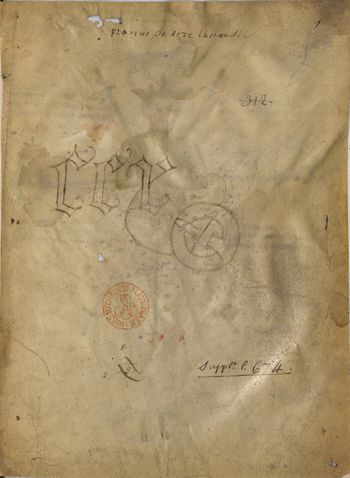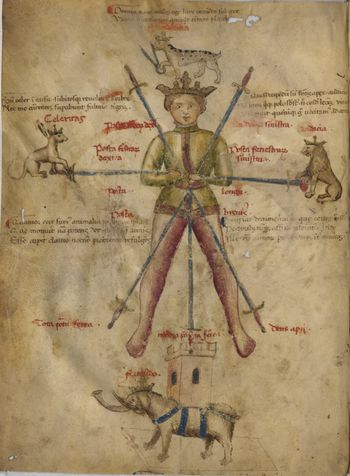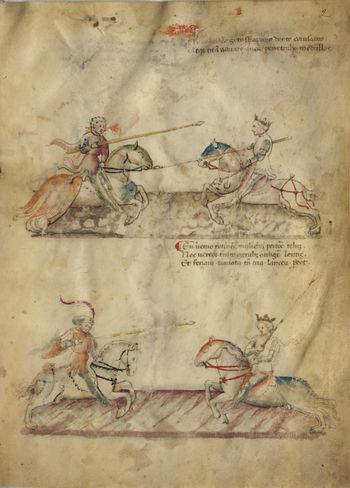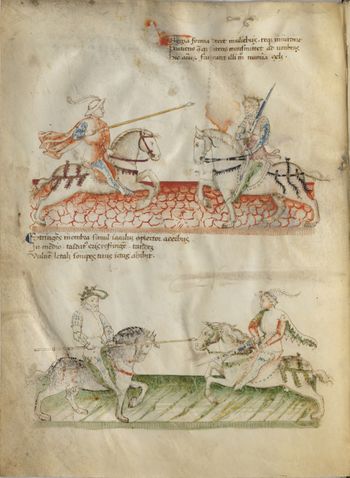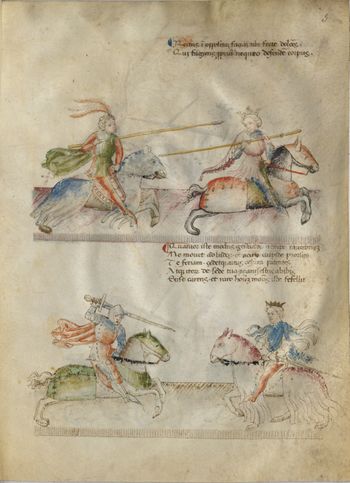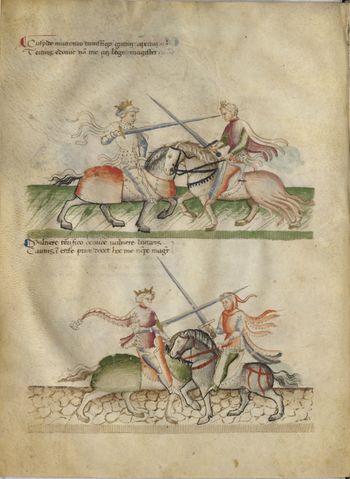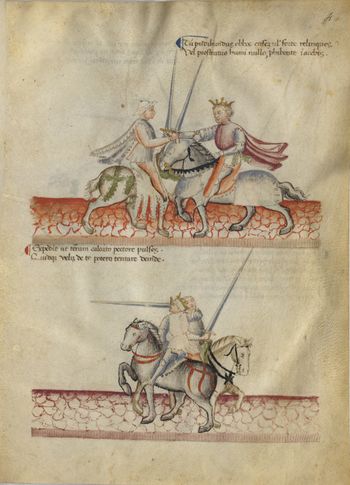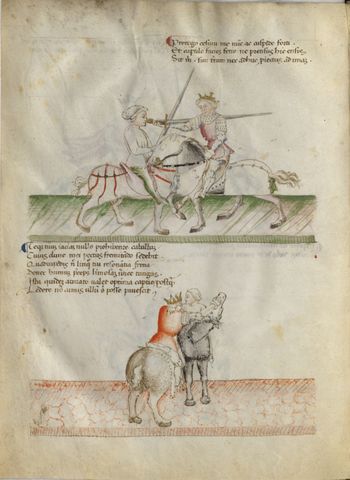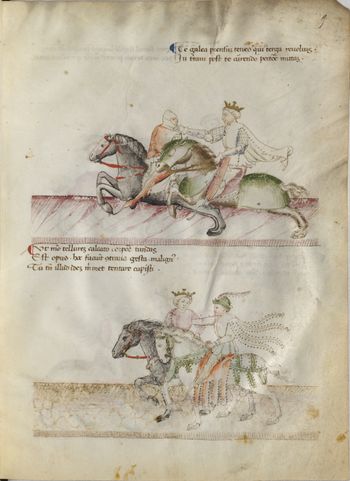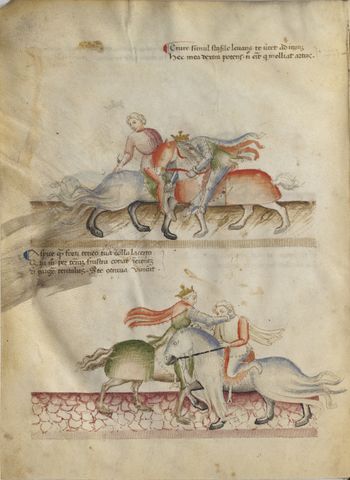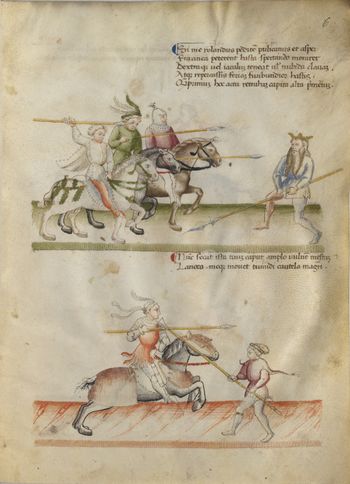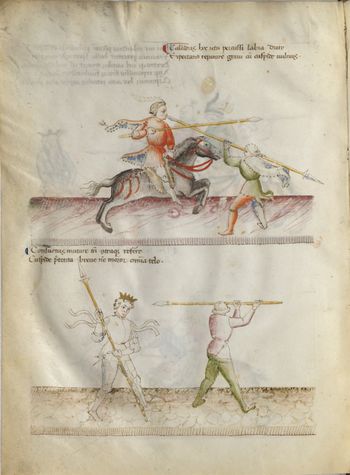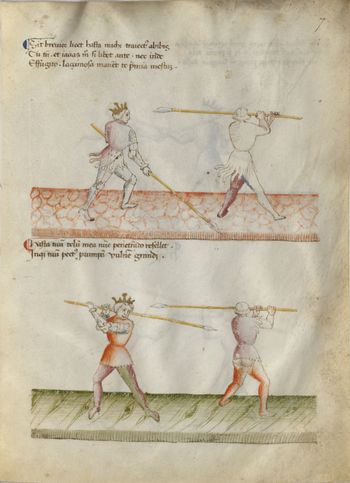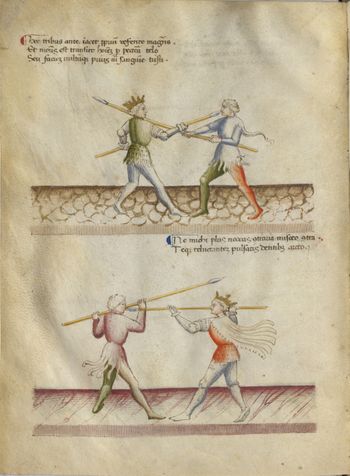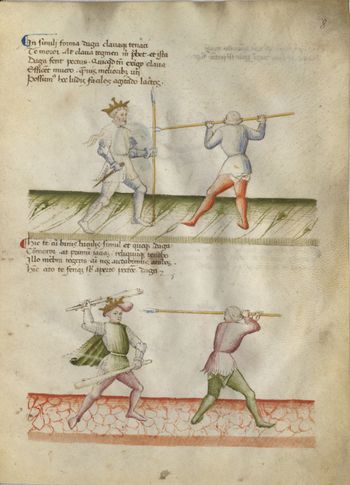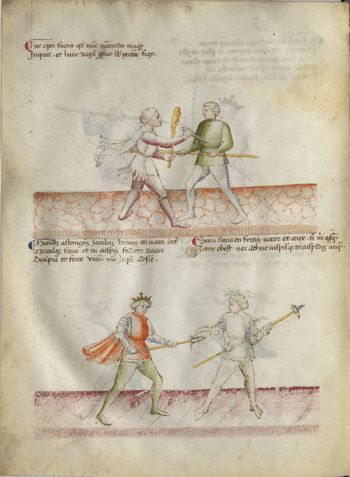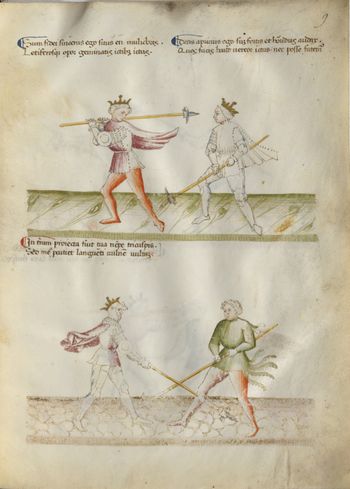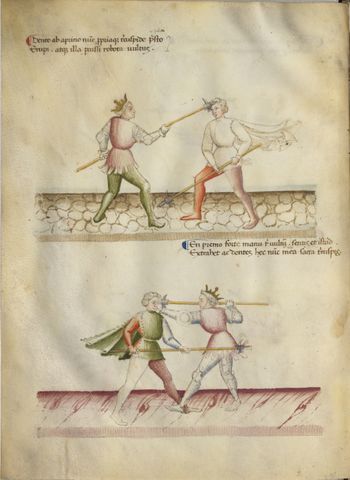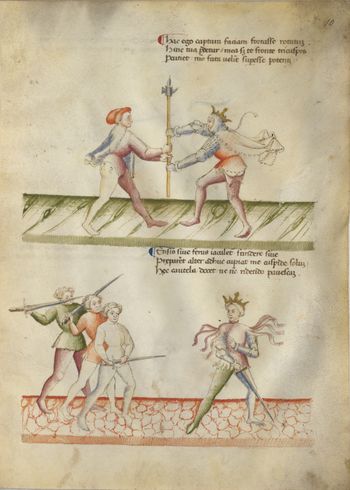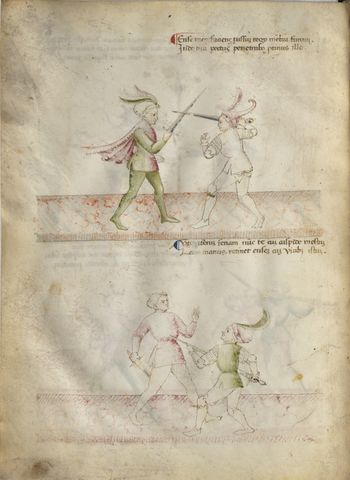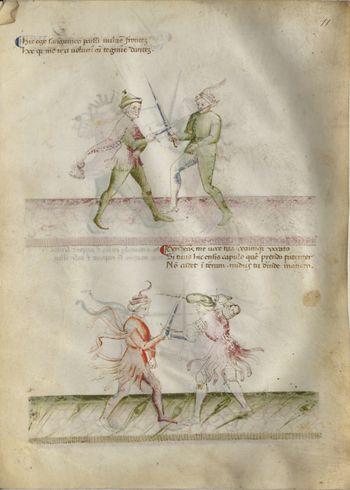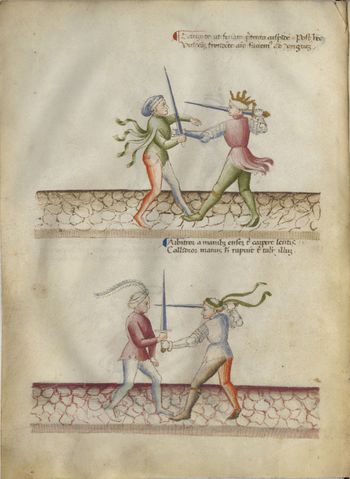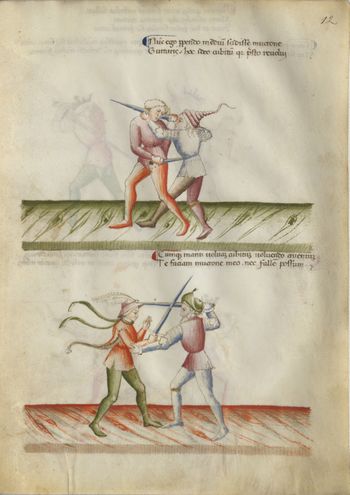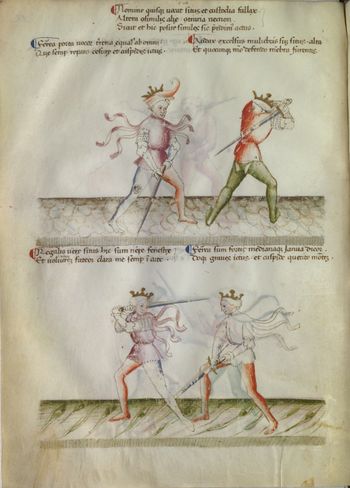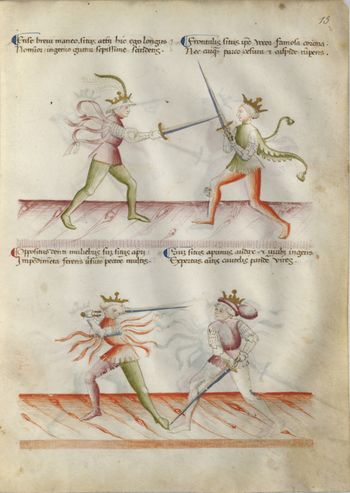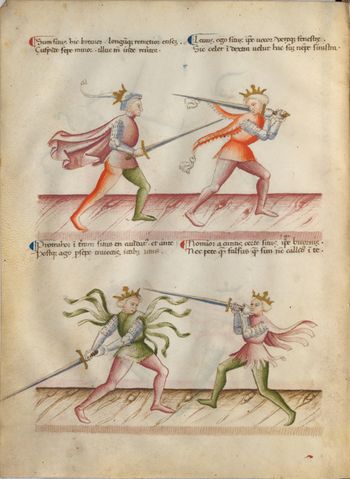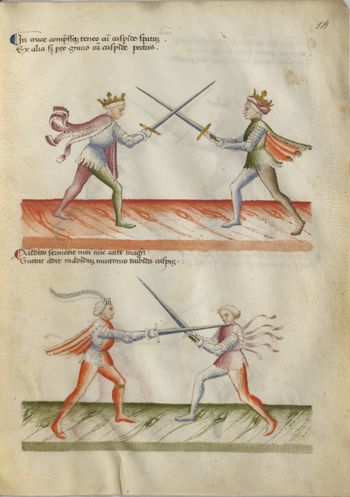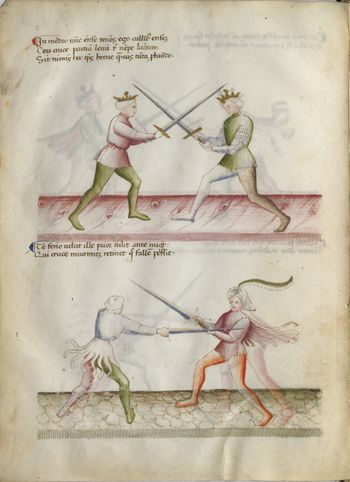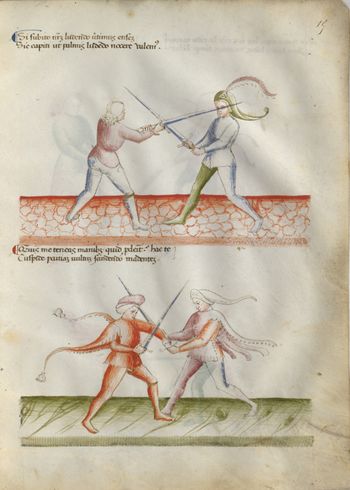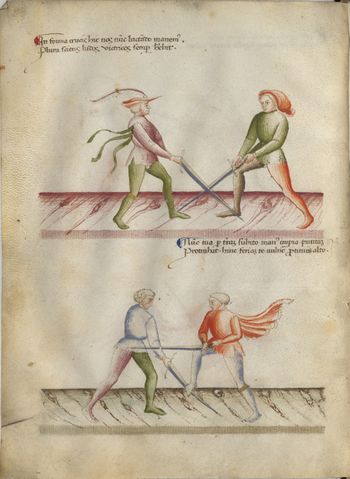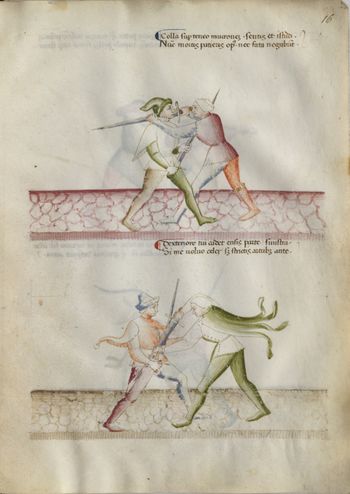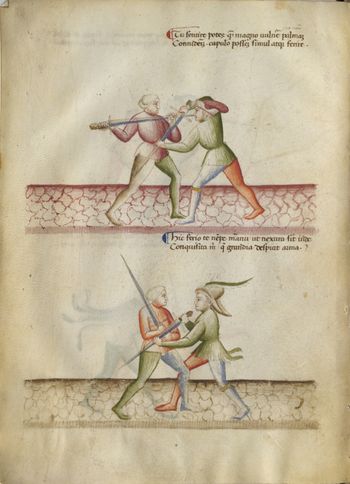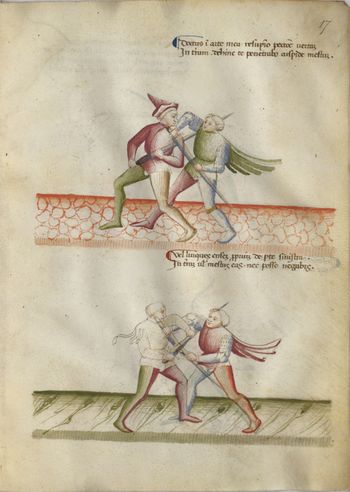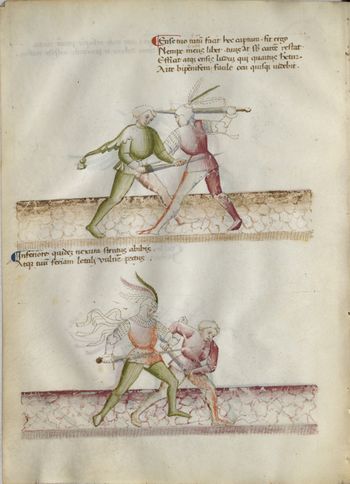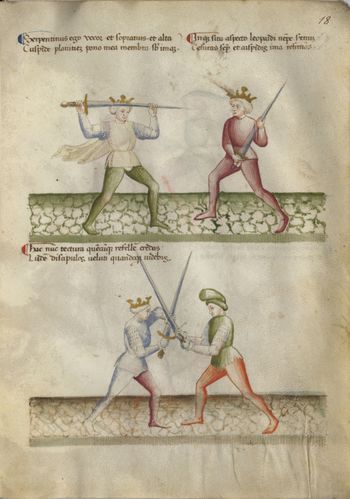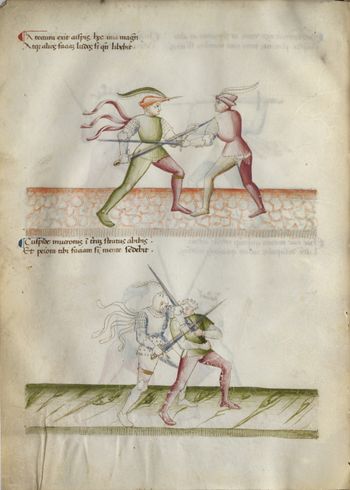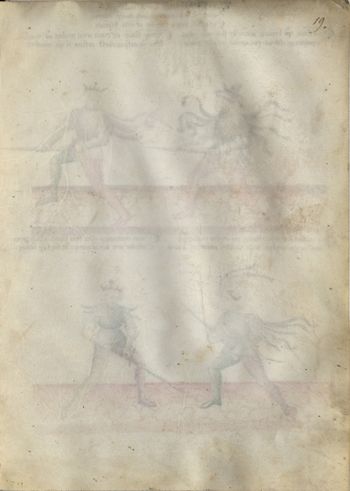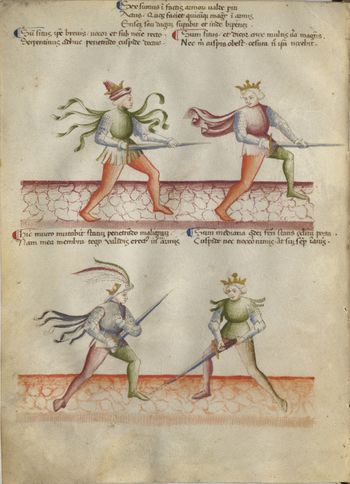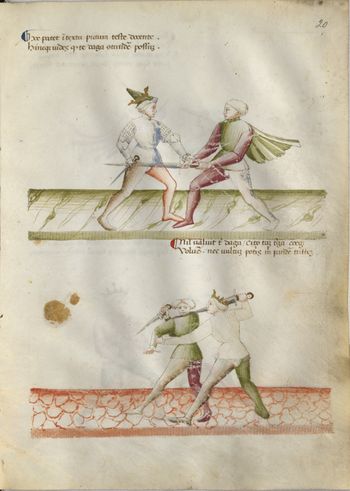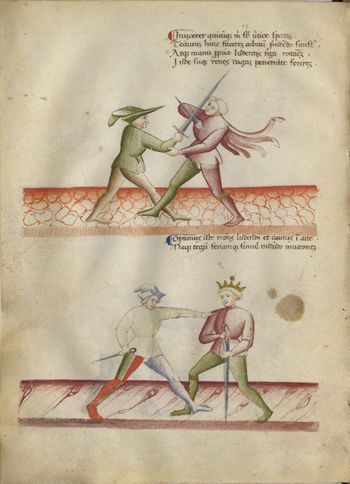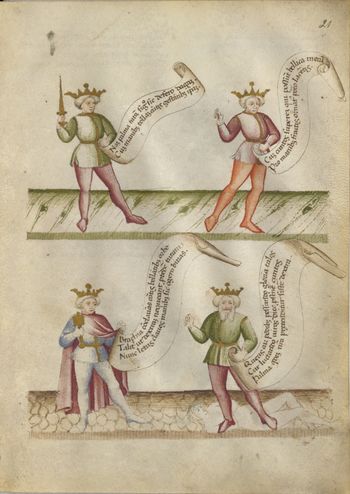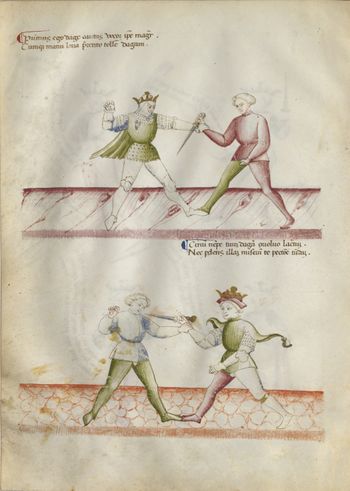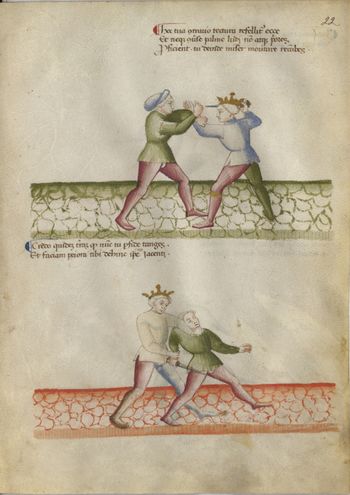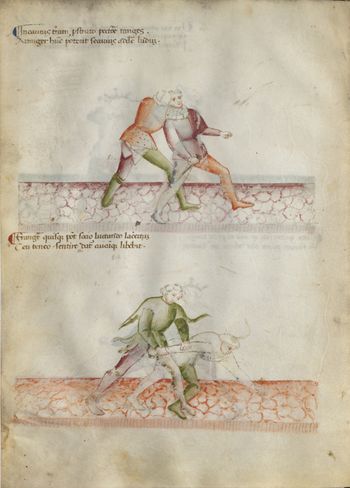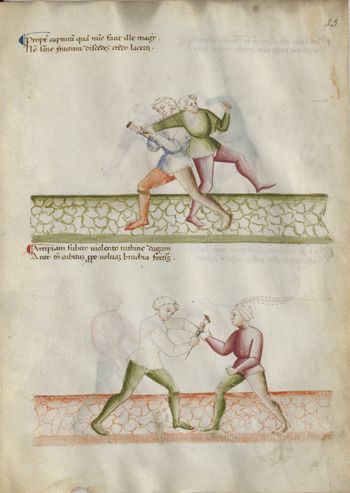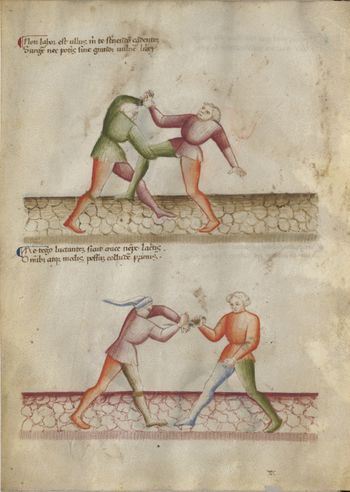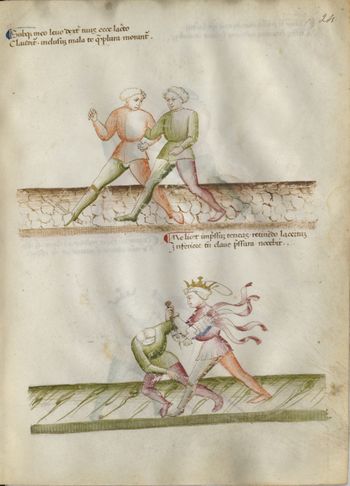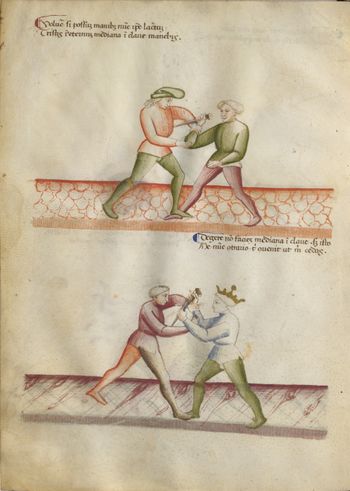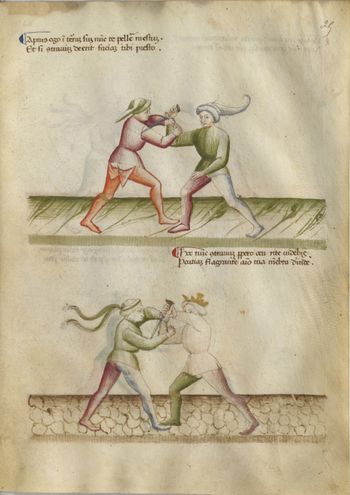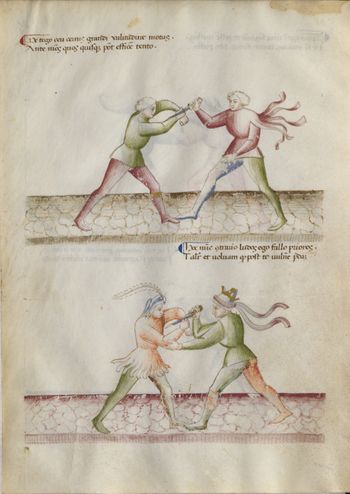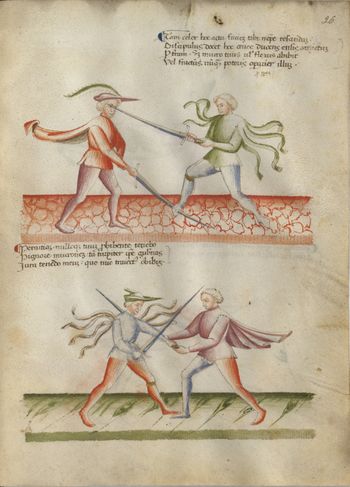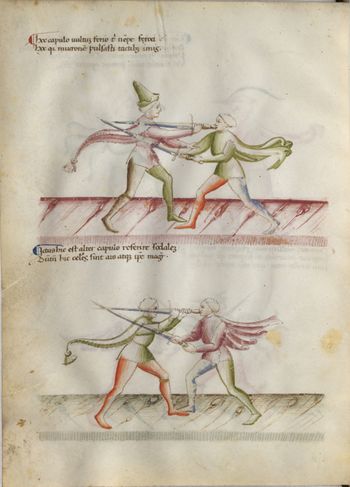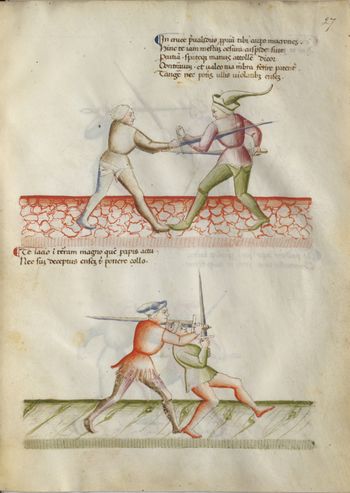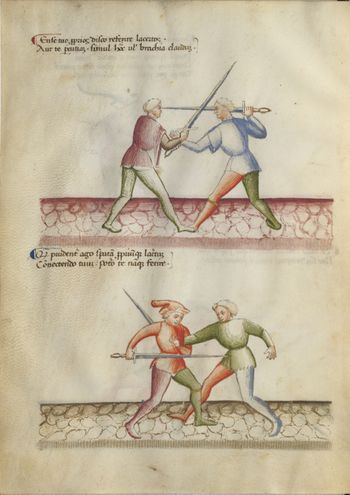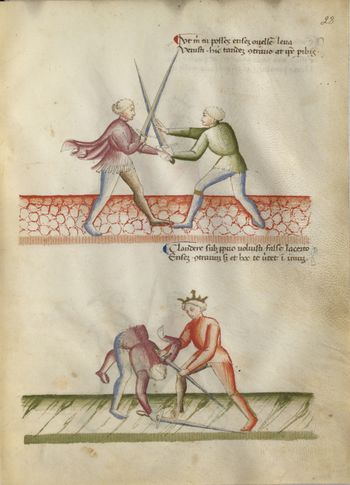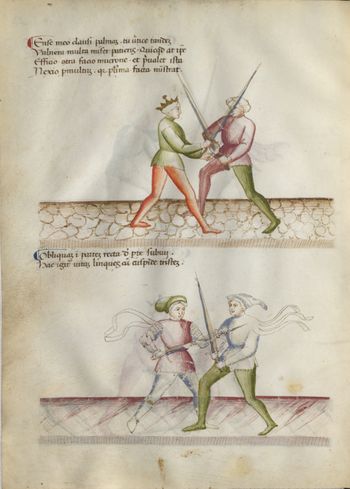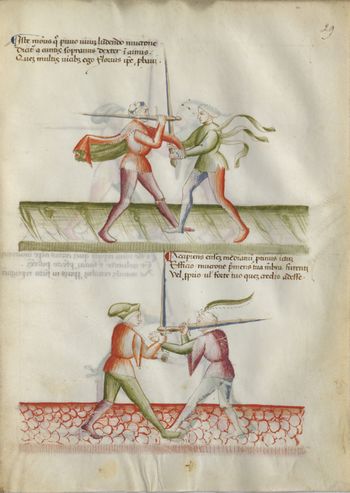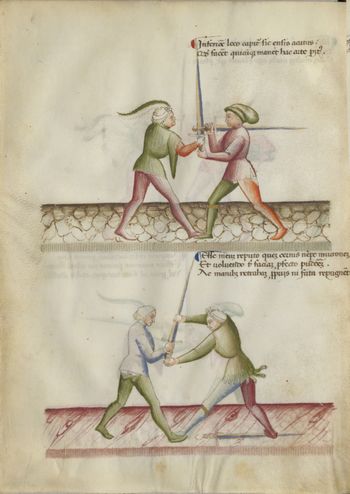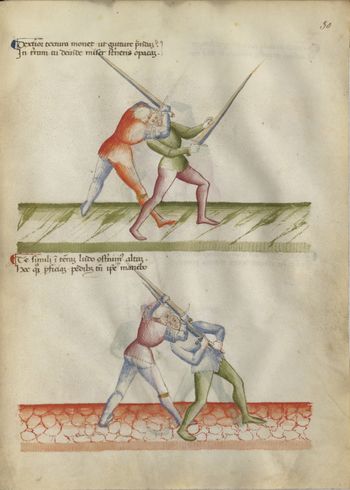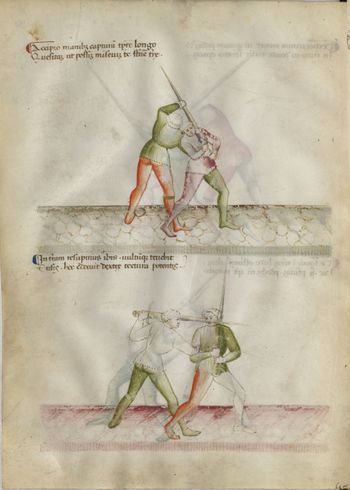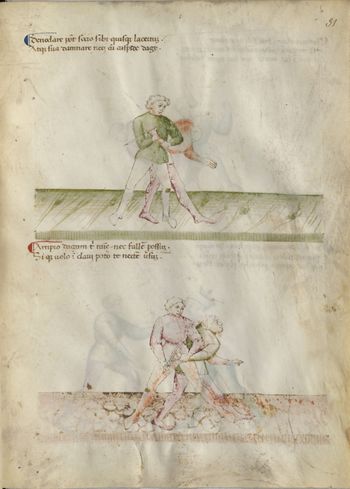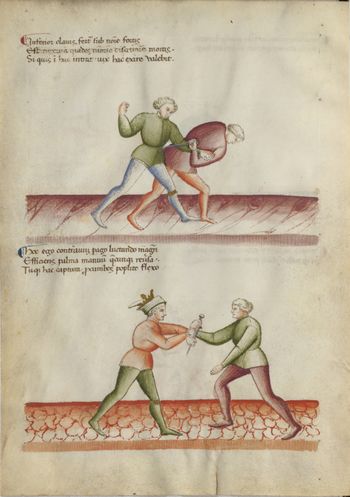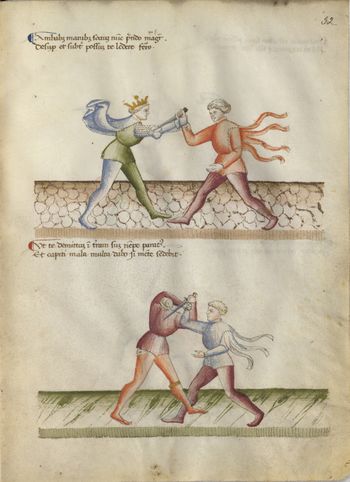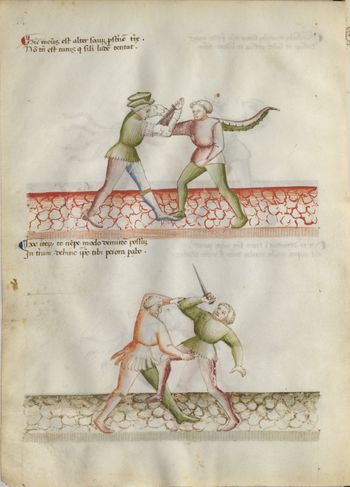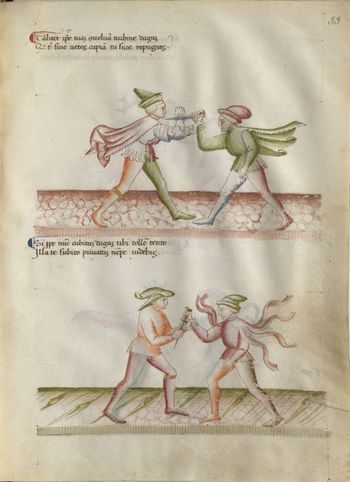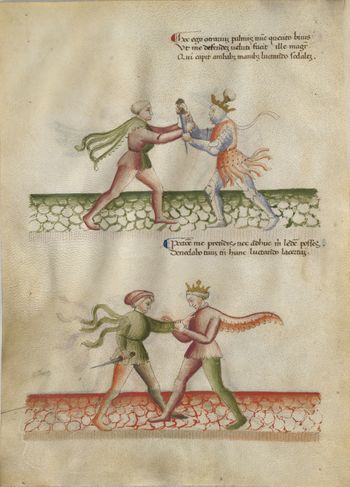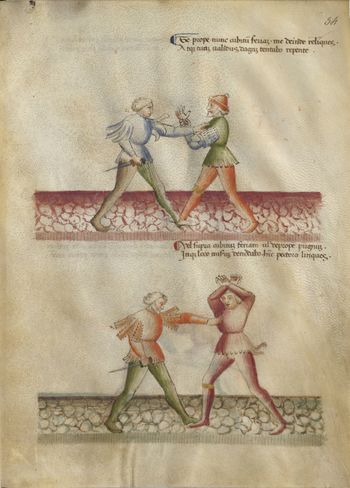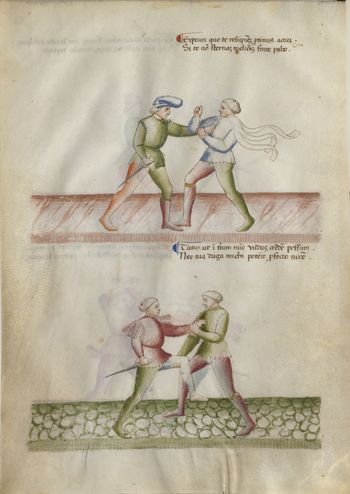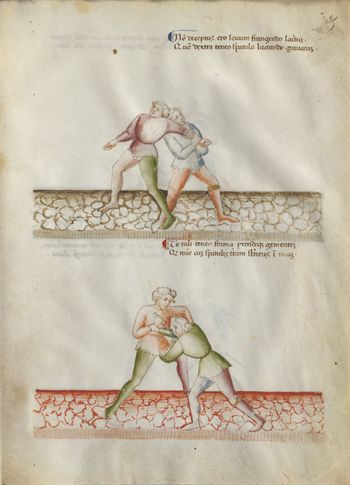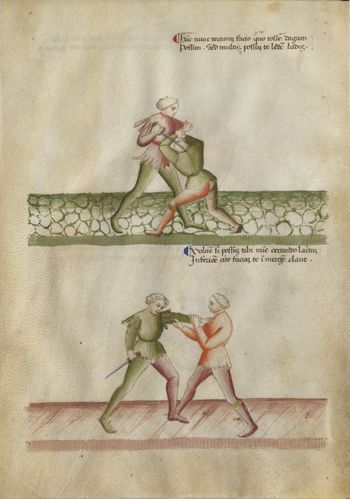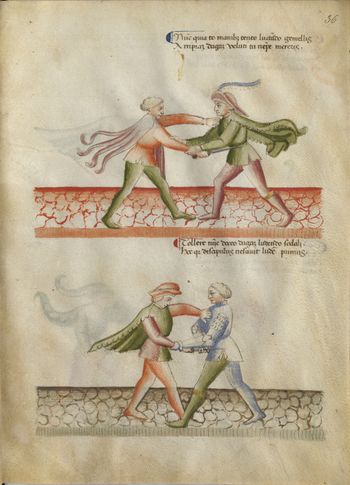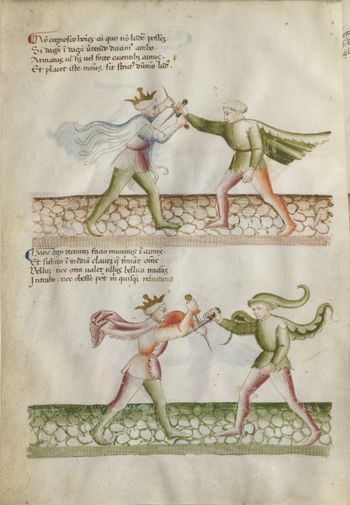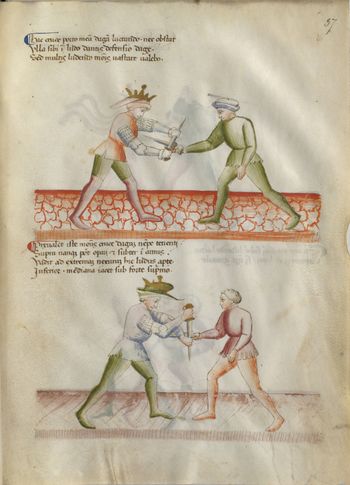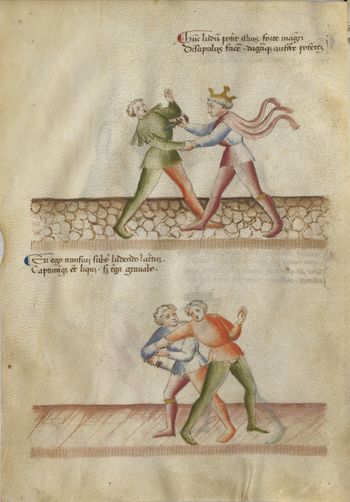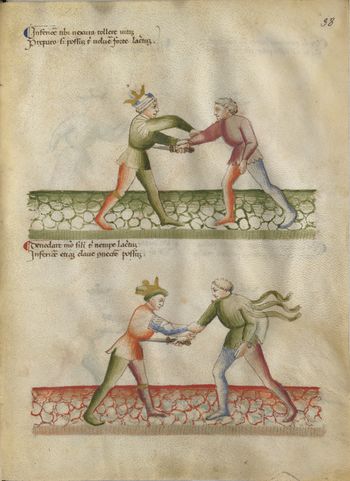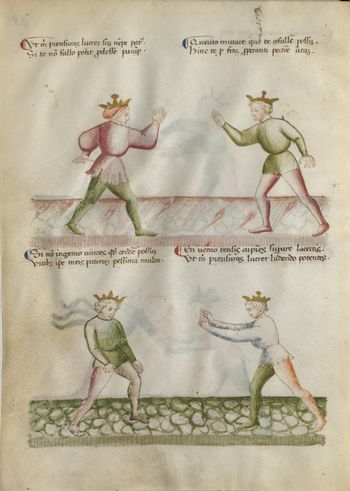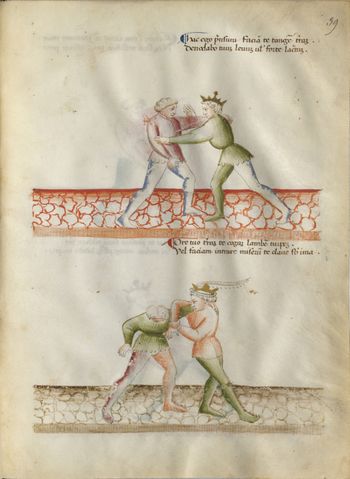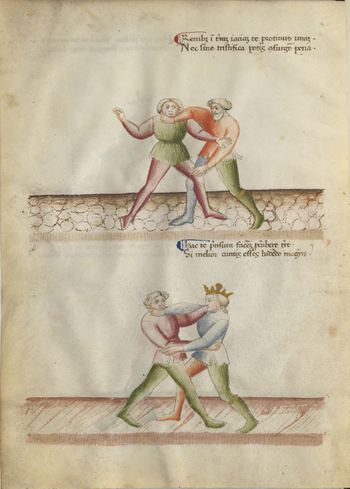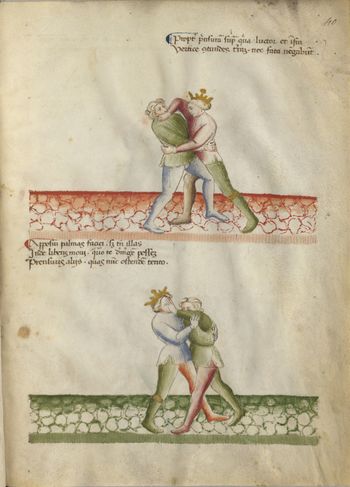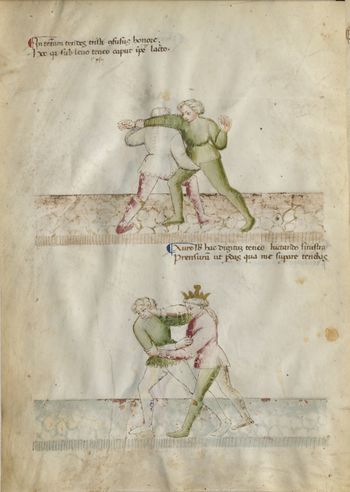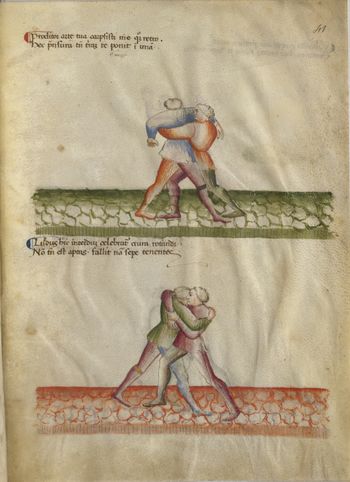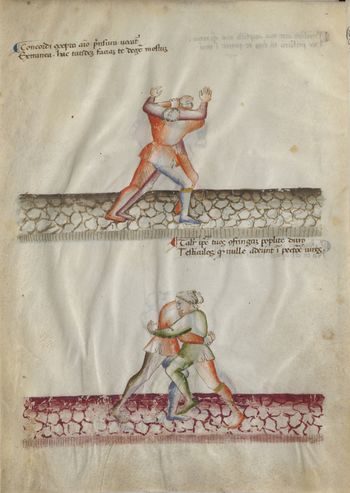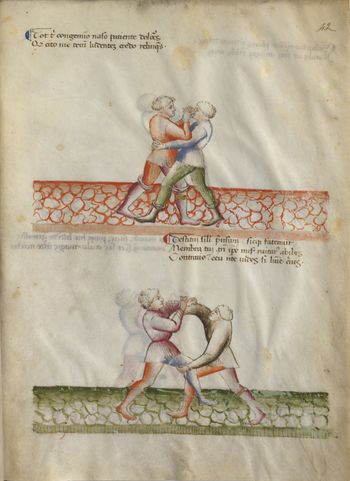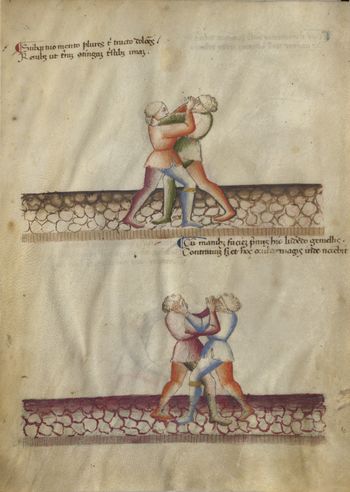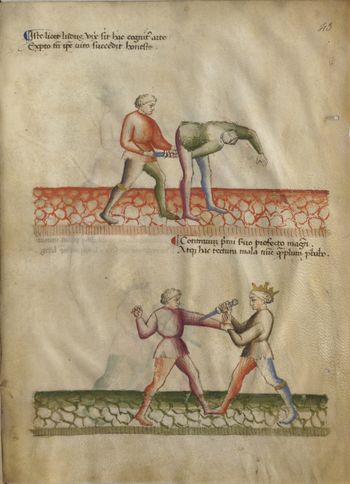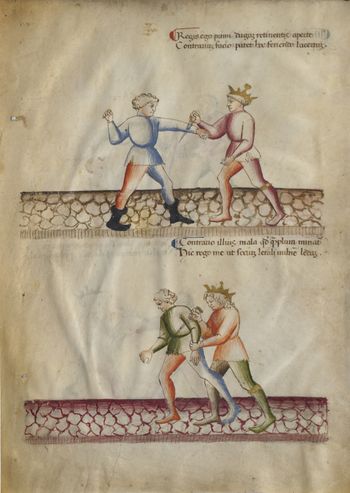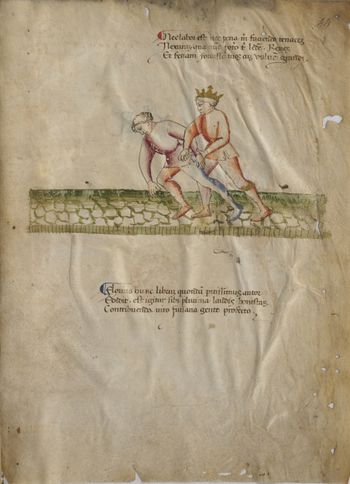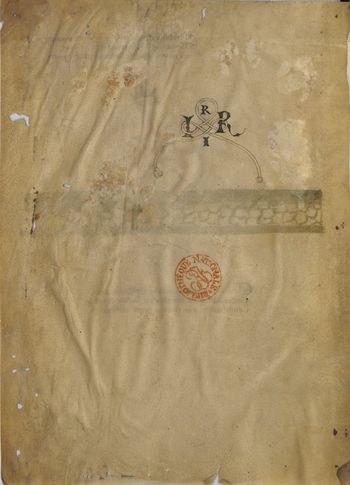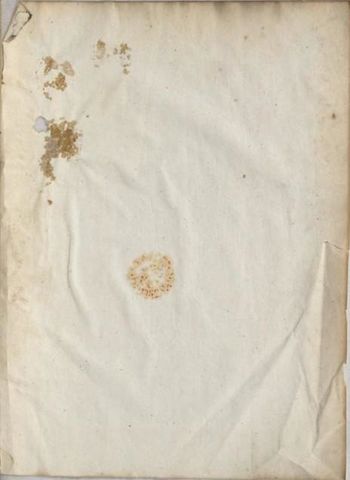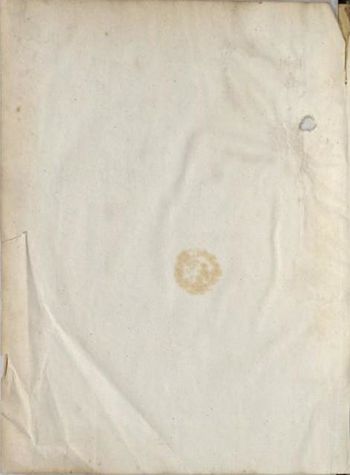|
|
You are not currently logged in. Are you accessing the unsecure (http) portal? Click here to switch to the secure portal. |
User:Kendra Brown/Florius/Side by side
Folia 1-10
01r
There is a small slash near the D which might be read as a comma, but I don’t think it is. I’ve noticed some people call the MS “Florius, de…” – this must be why.
At the same height, in the upper right corner, a numeral 1.
lower: 312, struck through
Large open blackletter “c c e” (as if practicing?), connected to pennanular device with curl at top—is this a logo of some sort?
Stamped, “Bibliotheque Nationale” in red circle
In brown ink, a six-pointed star with two swashes and a circle on a vertical line in the center, with E above the top point (? Could be something else, including S) and S at either side, even with the lower horizontal line.
“Supplt p. 674” in dark brown ink
01v
Vinco mensurans quicquid tentare placeb[ ] Prudentia ¶ Sum celer in cursu subitosque revolv[am][1] in orbes
Nec me currentem superabunt fulmia[2] tigrim. Celeritas Quadrupedum sum fortis apex, audacia
Natura[3] mea quoque polo subsunt. nunc[4] cordis leonem ||[5] vincit
[et superavit][6] quemcumque ergo vocitamus ad arma Audacia
Quae monuit nam potens Potuit[8] [...] in armis
Esse cupit clarus necnon probitate refulgens ¶ Accipiat [documenta] sibi(?) / quae cernit o(?)esse
Pectoribus [nullus] affixe indicitus. Inde
Ille erit [armorum] pr(?) [doc]tus inter amicos.
[below doctus: …et (hand M?)]
[around the master, in red:]
Posta Dominarum Sinistra
Posta fenestrarum dextra
Posta fenestrarum sinistra
Posta longa
Posta brevis
Tota porta ferea
Media porta ferrea
dens apri
✅¶ I, the Lynx, defeat all things born under the heavens by means of [my] discerning eyes,
I like trying to measure everything
✅Prudence
✅¶ I am swift in the course and I would turn back in sudden circles,[10]
and lightning bolts[11] don't overtake me, the Running Tiger.
✅Swiftness
✅¶ I, Audacity, am the strong peak of quadrupeds
due to my nature. They are likewise under the pole star. now it conquers
and overcomes the lion of the heart. Therefore we call everyone to arms
✅Audacity
✅Behold! We are the four great distinguished animals [...] hereafter
whose powerful nature advises[12] ... in arms,
which seeks to be illustrious and indeed shining with honesty.
✅You all [would] proclaim that whoever would comprehend the lessons,
[that one] perceives them [the lessons] to be affixed in our hearts. Thence
that very skilled one will be among friends of arms.[13]
✅The position[14] of women on the right
The position of ladies on the left
✅The position of windows on the right
The position of windows on the left
✅The long position
The short position
✅The whole iron gate
The middle iron gate
The tusk of the boar
Fortitude
02r
- ¶ En venio retinens muliebrj pectore telum.
Nec vereor terram genibus contingere lentis.
Et feriam variata tamen tua lancea praedet.
✅Now I carry the spear, moving quickly underneath in the manner of the boar's tusk.
And in order that I be able to cause [yours][17] to diverge, I will penetrate the innermost parts.
✅¶ Lo, I come, holding back my javelin at the womanly breast.
I don't fear touching the ground due to my flexible knees.
And I would strike, having marked [you] black and blue[18], and still your lance will lose [the fight]
02v
- ¶ Regia forma decet muliebris. teque mucrone[19]
Percutiens contra que furens transmittet ad umbras
Hic animus / faveant illi modo numina caeli.
In medio. tardatus eris refringere[21] tandem
Vulnere letali sonipes[22] tuus ictus abibit.
✅¶ The royal, womanly form is proper. And this spirit,
hitting and raging against you with the tip, sends [you] to the shadows.
If the gods in heaven should favor this method.
✅¶ Drawing [my] limbs simultaneously inward, I, the Harsh One, grip the javelin
in the middle. You will have been delayed in breaking through [my guard].
In the end, your horse will depart having been struck with deadly wounds.
03r
✅¶ Straightforward in opposition, I cause you great pains.
The one fleeing is unable to defend his own body.[26]
✅¶ That method of carrying surely moves the tip to four plays.
And I strike you straight on with the [sharp] point.
And the arm cuts the openings with a cut.
And being deprived of your sword, you will again obviously depart from your seat.[27]
That method rarely fails a person.
03v
Tertius edocuit nam me cum lege magister.
Cautus in ense prior docet hoc me nempe magister.
✅¶ I pierce the exposed neck with the point of my sword[29],
Because the third master thoroughly taught me using a rule.
✅¶ Fighting to wound the neck with a terrifying wound.[30]
The first master, on guard in the sword, truly teaches me this.
04r
- ¶ Tu pudibundus obhoc ensem vel forte relinques
Vel prostratus humi nullo prohibente iacebis.
Quidque velim de te potero tentare deinde.
✅¶ You, shamefaced on account of this, will perhaps abandon your sword,
or, having been struck down, you will lie on the ground with nothing to prevent it.
✅¶ It is convenient that you thump the ground while your chest is trampled[31].
Afterwards, I will be able to try whatever I want concerning you.
04v
- ¶ Protego[32] cesura me nunc / ac cuspide forti.
Et capulo[33] faciem ferio / ne prensus hic ensis
Sit mihi / sim terram nec adhuc proiectus ad imam.
Cuius clune / mei pectus fremitando sedebit.
Quadrupedis nec linquo tui resonantia frena[35] /
Donec humum praeceps limosam vertice tangas.
Ista quidem armato valet optima captio / postquam
Ledere non armis ullum sibi posse pavescit
✅¶ I now protect myself with a cut and a strong point.
And I strike the face with the sword hilt, so that my own sword would not be grasped
in these circumstances. Nor would I have been thrown to the farthest ground.[36]
✅¶ I will throw you and your horse; prevented by no one,
The chest [of my horse] will rest at the haunches of your whinnying horse
I will not release the ringing reins of your quadruped
until you precipitously strike the muddy ground with the crown of your head.
This best deception indeed prevails against [an] armored [person], Since[37]
they do not begin to fear that anyone is able to injure them with weapons[38].
05r
- ¶ Te galea[39] prensum teneo / qui terga revolvis.
In terram post te currendo pectore mittam.
Est opus . hoc faciunt contraria gesta . malignus
Tu tamen illud idem mihimet tentare cupisti.
✅¶ I maintain this grasp on your helmet, since you are turning your back.
I would send you to the ground and afterwards your chest will have been run [over].
✅¶ For you to pound the earth with my trampled body,
the work, which the countering actions carry out, is the same, that YOU,
the Spiteful One, have still desired to attempt against me of all people.[41]
05v
- ¶ Crure simul stafile levans / te vertet ad imum
Hec mea dextra potens. nec erit quae molliat artus.[42]
Qui modo per terram frustra conatis[44] inermem[45]
Spargere[46] tentabas. sed te contraria vincunt .
✅¶ Lifting by the leg and also by the stirrup[47], this, my strong right [hand],
will turn you to the farthest [ground], there will not be anyone who would make [my] limb <arm> feeble.
✅¶ Observe how I hold your neck with my strong upper arm
With these actions, you have vainly tried to scatter the Weaponless One
to the ground in this way. But the counters conquer you.[48]
06r
- ¶ Si me rolandus[49] peditem pulicanus[50] et asper
Fraxinea[51] peterent hasta spectando morarer /[52]
Dextraque vel iaculum teneat vel turbida clavam[53].
Atque repercussis feriam furibundior[54] hastis./
Quamprimum hoc actu retraham capita alta prementum.
- ¶ Nunc secat ista tuum caput amplo vulnere mestum
Lancea. meque movet tumidi[55] cautela magistri.
✅¶ If Roland and cruel Pulicanus had attacked me, a footman,
with spears made of ash, I would have delayed for the purpose of observation,
and the unruly right hand would hold either a javelin or a club,
and, having caused the spears to rebound, I strike more furiously.
By this action, I would pull back[56] the lofty heads of those who oppress[57] as soon as possible.
✅¶ The lance now cuts your ill-omened head with great wounds,
and it moves me out of the guard of the arrogant master.
06v
- ¶ Callidus hoc ictu percussi labia duro,
Expectans reparare[58] gravi cum cuspide vulnus.
Cuspide pertenta, breve nunc moror omnia telo.
✅¶ I, the Clever One, thrust through the lips with the harsh strike,
anticipating the renewal of the wound using a heavy point.
✅¶ Accustomed to shifting, to move back and forth with the extended spear point: yet,
I now tarry with the short javelin[59] in all respects.
07r
Tu tamen. et iacias meo si libet ante. nec inde
Effugito. lacrimosa manent te praemia mestum.
Inque tuum pectus prorumpam vulnere grandi.
✅¶ My spear is probably shorter, yet you will die,
having been pierced. It pleases me for you to throw first, and
then not flee. Tearful prizes await you[60], the Ill-Omened One.
✅¶ Now, while your javelin is entering, my spear will repel it.
And I would burst into your chest with a great wound.
07v
[61]Et modus est transire hominem per pectora telo /
Seu faciem vultumque prius cum sanguine tristi.
✅¶ They[64] throw this particular [attack] of the previous three masters[65] to strike back.
And this is the method to run a person through with a javelin to the chest
or face, and you previously bruised the visage with blood.
✅ ¶ You do not harm me much, I stir up counters against
you, the Resisting One, and I move close while knocking in [your] teeth.
08r
Te moror, At clava tegmen mihi prebet. et ista
Daga ferit pectus. Quicquid tamen exigo clava,
Efficeret mucro. quamvis melioribus uti
Possumus hoc ludis, faciles agitando[66] lacertos.
Conmoror. at primum iaciam. reliquumque tenebo
[67]Illo membra tegens / cum nos arctabimus ambos.
Hinc cito te feriam sed aperto pectore daga.
✅¶ In like manner, I delay you with steadfast dagger and staff,
and while the staff provides covering for me, that dagger
strikes the chest. Yet whatever I finish with the staff,
the sword[68] shall accomplish. We can make
much better use of this play by moving the quick shoulders.
✅ ¶ I tarry here with you with two sticks and at the same time a dagger.
And I throw the first. And I will hold the remaining
covering the limbs with it. At the same time we will both of us move close together.
From here, I quickly strike you, but your chest is opened by the dagger.
08v
Inquit. et hanc dagam proprio sub pectore figo.
Mortales / situs:. et ni cuspis fallere tentet
Decipiam te forte Virum. meo Jupiter adsit.
- ¶ Sum situs en fortis. vocor et crux. nec(?) mihi quesquam [69]
Ictus obest. nec adhuc cuspisque tricuspidis unquam.
✅¶ This, which the master now says in his description, I am occupied with bringing about.
and I fix this dagger below your own chest
✅¶ A Javelin having been constrained by hands, lo! I am called the short position
Among mortals. And if the spear point should attempt to deceive,
I shall, as luck would have it, mislead you, the Man. If Jupiter were to aid me.
✅ ¶ Behold, I am a strong position. And I am called the cross. Neither does any
strike bother me. And neither the point of the triple-pointed [pollaxe] at any time.
09r
Letiferosque operor geminatis ictibus ictus.
- ¶ Dens aprinus ego sum fortis et horridus audax.
Quos facis[71] haud vereor ictus. nec posse fatemur
Sed mea percutiet languenti vulnere vultum.
✅ ¶ Behold, I, the position of the woman, am pure of faith.
and by doubling the strike, I carry out the fatal strikes.
✅ ¶ I, the boar's tusk, am strong, frightful, and bold
I have no respect at all for the hit of anyone's axe; neither do we admit the possibility.
✅ ¶ Your triple-pointed [pollaxe] has truly been thrown down into the ground.
But mine will strike [your] visage with a wilting wound.
09v
Erupi. atque illa percussi robora vultus.
- ¶ En premo forte manu tibi vultum. sentis et istud
Extrahet ac dentes haec nunc mea[73] sacra tricuspis.
✅¶ And now I have burst out from the tusk of the boar ready to go using [my] own triple-point
And I have struck those strongest parts of [your] visage.[74]
✅¶ Behold, I overwhelm your visage using a strong hand, and you <yourself> feel that
and now my sacred triple-pointed [pollaxe] extracts [your] teeth.
10r
- ¶ Hac ego captura[75] the faciam fortasse rotatum.
Hinc tua perdetur / mea secundum te fronte tricuspis
Percutiet / modo fata velint superesse potenti.
✅ ¶ Perhaps I would make a rotation using this taking.
From there, your [weapon] is lost, afterwards, my triple-pointed [pollaxe] hits you in the forehead.
If the fates are willing for the strong to survive.
✅¶ Whether the wild sword is thrown as a javelin, or the second [opponent] prepares
to cut [me] to pieces, that one [the third] as yet only seeks me with the point,
this guard shows that I, with a mocking laugh, am not afraid now.[78]
10v
✅¶ Taking a step, I cover the limbs with my raging sword,[83]
From there, I will penetrate your chest with that [sword] without pause.
✅¶ And in order to strike you, the Ill-Omened One, again with my point now,
The left hand supports that sword with Strength.
Folia 11-20
11r
Hoc quia me texi volucri cum tegmine dantem.
- ¶ Derideas me voce tua / cecumque vocato /
Si tuus hic ensis / capulo quem prendo patenter
Non cadet in terram. nudus tu deinde maneto
✅¶ In these circumstances, I have pierced your forehead with a bloody wound,
because I defend this infliction with a swift cover of myself.
✅¶ You would mock me with your voice and you will have to call me blind,
If your sword, which I have clearly caught by the hilt, does not drop to the ground[84].
Afterwards, you will have to[85] remain denuded [of your weapon].
11v
- [86]¶ Detego te ut feriam pretenta cuspide. Post haec
Vindictam frendente animo faciemus ad Unguem.
- ¶ Arbitror a manibus ensem tibi carpere lentis /
Callidior manus haec rapuit tibi taliter illum
12r
- ¶ Nunc ego perpendo medium scidisse mucrone
Gutturis. hoc ideo / cubitum quia presto revolui
- ¶ Cumque manu voluam cubitum voluendo cruentum
Te faciam mucrone meo. nec fallere possum.
✅¶ At present, I am carefully considering splitting the middle of [your] neck
with my edge[91]. Which is the reason [that] I turned this elbow back here.
✅ ¶ And with a hand, I turn the elbow in a circle. By turning in a circle
I make you bloody with my tip. I can't fail.
12v
- ¶ Nomine quisque vocat[92] situs / et custodia fallax.
Altera consimilis aliae / contraria [93] necnon.
Sicut et hic posite / similes sic prendimus actus.
Quae semper reparo / cesurae et cuspidis ictus.
- ¶ Audax / excelsus / muliebris sum situs. alta
Et quocunque modo defendo membra furentis.
Et volucrem[94] fateor clara me semper in arte.
- ¶ Ferrea sum fortis / medianaque Janua dicor.
Doque graves ictus. et cuspide querito mortem.
✅¶ Each position and deceitful guard is called by a name
Both similar to another, and indeed opposite[95]
Position [yourself][96] just as here, thus we grasp[97] the actions
✅¶ I am called the iron gate by all men, on a level with the ground.
I always redress any such strikes of the cutting [edge] and of the point.
✅¶ I am the bold, lofty position of the woman. high
and in whatever method I defend the limbs from rage[98]
✅¶ Here I am certainly the regal position of the "true window"
and I always acknowledge myself as swift in the famous art.
✅¶ I am the strong iron, and I am called the middle Door.
And I bestow heavy strikes and I seek death with the point.
13r
Nominor / ingenio guttur sepissime scindens.
- ¶ Frontalis situs ipse vocor / famosa corona.
Nec cuique parco / cesura et cuspide rumpens.
Impedimenta ferens versuto[99] pectore multis.
- ¶ Sum situs aprinus audax / et viribus ingens /
Expertus cunctis cautelis pandere Vires.
✅¶ I remain a short sword, and yet here I am called the Long
position, most often cleaving the neck due to my natural inclination.
✅ ¶ I am called the position of the Browband[100], that is the famous Crown.
Neither do I spare anyone, cutting and breaking with the point
✅¶ I am the position of the Woman opposite the Boar's Tusk,
pregnant[101] with obstacles, with a heart full of cunning toward many.
✅¶ I am the position of the bold Boar and unnatural in bodily strength,
I am well-known for splitting open the strength in every guard
13v
Cuspide sepe[103] minor. illuc tamen inde revertor(?).
- ¶ Laevus[104] e:go situs ipse vocor / Veraeque fenestrae.
Sic celer in dextra velut hac sum nempe sinistra.
Postque ago persaepe traiectis ictibus ictus[105].
- ¶ Nominor a cunctis certe situs ipse[106] bicornis.
Nec pete quam falsus / quam sim nunc callidus in te
✅ ¶ I am the short stance here. And I move the sword back [to its original position].
I often threaten with the point. Yet I thenceforth return back to that place.
✅¶ I am called the left position itself and the True window.
Thus swift on the right side just as I am naturally here on the left.
✅¶ Behold, I, the tailed position, am pulled forward on the ground. I very often carry out
a strike in front or behind, while [your] strike is passing through
✅¶ I myself am certainly named by all the two-horned position.
However deceptively you ought to attack, now I will be as cunning towards you.
14r
Ex alia secundum parte gravo cum cuspide pectus.
Guttur adit madidum mucronis turbida cuspis.
✅¶ I hold the sword [spata] pressed together with the point in a cross.
Immediately after, from the other side I oppress the chest with the point.
✅¶ Now, having previously listened to the lecture of my master,
The violent tip of the sword approaches the juicy throat.
14v
Ceu cruce / percutiam laevum tibi nempe lacertum
Sit nimis hoc tempus breve quamvis tanta probando
Qui cruce mucronem retinet /[108] quo fallere possit.
✅¶ I, the Clever One, currently holding the sword in the middle of the sword,
as in a cross; I will certainly hit your left shoulder
This time might be exceedingly short: with this having been tested so much.
✅¶ I strike a bargain with you[109] just as that earlier master told before.
Whoever restrains the tip with the cross can deceive with it.[110]
15r
Sic capiti ut palmis ludendo nocere valemus.
Cuspide percutiam vultum scindendo madentem.
✅¶ If, in the swordplay, we suddenly turn our sword,
Thus we are strong to harm the head using the hands in the swordplay.
✅¶ Although you hold me in your hands, something was trodden underfoot. By
rending with this point, I will hit your dripping face.
15v
Plura sciens ludos Victrices semper habebit.
- ¶ Nunc tua per terram subito manus impia puntam
Protrahat. hinc feriam te vulnere protinus alto.
✅¶ While fighting in the shape of a cross, we now remain here.
The one knowing more always has Victorious plays.
✅¶ Suddenly your wicked hand drags a point
to the ground. From here I would strike you with a high wound without pause.
16r
- ¶ Colla super teneo mucronem. sentis et istud.
Nunc mortis patieris opus. nec fata negabunt.
- ¶ Dexteriore tui cadet ensis parte / sinistra
Si me voluo celer / sed strictis artubus ante.
✅¶ I hold the tip at your neck. And you feel that.
You will now suffer the work of death. And the fates will not deny [it].
✅¶ Your sword will fall on the rightmost side, if
I turn myself to the left swiftly and also with my limbs drawn in tightly in front.[111]
16v
- ¶ Tu sentire potes. quam magno vulnere palmam[112]
Contuderim. capulo possem simul atque ferire.
- ¶ Hic ferio te nempe in manu / ut nexura sit inde
Conquisita mihi / qua grandia despicit arma.
✅¶ You can feel, how I have pulped the palm <that is, the hand> with great
wounds. And, at the same time, I could strike you with the hilt.
✅¶ In this circumstance, I strike you truly in the hand, so that the
snare, which is then sought out by me, disdains great arms.
17r
- ¶ Doctus in arte mea resupino pectore vertam
In terram. dehinc te penetrabo cuspide mestum.
- ¶ Vel linques ensem proprium de parte sinistra.
In terram vel mestus eas. nec posse negabis.
✅¶ Learned in my art, I turn you into the ground, thrown over backwards
by your chest. henceforth I will penetrate you, the Ill-Omened One, using the point
✅¶ Either you will leave your own sword behind from [your] left side,
or you, the Ill-Omened One, go into the ground.[113] You cannot refuse.
17v
- ¶ Ense tuo tutum[114] facit hec[115] captura. fit ergo
Nempe meus[116] liber. tuus at sub carcere restat.
Efficit atque ensis ludum qui quartus habetur.[117]
Arte[118] bipennifera / facile ceu quisque videbit.
Atque tuum feriam letali vulnere pectus.
✅¶ This taking makes <me> safe from your sword. Therefore, it happens
that mine <that is, [my] sword> is truly free. But on the other hand, yours remains imprisoned.
And the sword brings about the play which is the fourth[119]
in the art of wielding the two-edged axe[120], as any can easily see.
✅¶ Using this lower snare, you will indeed depart prostrate.
and I will strike you (in) the chest with a lethal wound.
18r
Cuspide planitiem pono mea membra sub imam.
- ¶ Inque situ aspecto leopardi nempe serenum
Cesuras semper et cuspidis ima refrenans
Ludere discipulos veluti quandoque videbis.
✅¶ I am called the serpent, and also tall and high
with the point level, I place my limbs below it to the greatest extent.
✅¶ And in the position of the leopard, I truly gaze out serenely,
always restraining the deepest cuts of the point as well.
✅¶ You currently have faith in this cover to refute anyone at any time,
just as you will see whenever the students are playing.
18v
Atque alios faciam ludos si quando libebit.
Et pejora tibi faciam sibi mente sedebit.
✅¶ This last point emerges from the cover of the master
and I will make other plays, if only because it pleases me.
✅¶ You will depart, spread on the ground with the point of your sword[121],
and I will do worse to you if that remains in mind.
19r
19v
- ¶ Sex sumus in factis armorum valde periti
Actus. Quos faciet quicumque magister in armis
Ensem seu dagam superabit et inde bipennem.
Serpentinus adhuc penetrando cuspide doctus.
- ¶ Sum situs, et dicor crux multis vera magistris.
Nec mihi cuspis obest, cesura nec ipsa nocebit.
Nam mea membra tego validis erectus in[122] armis
- ¶ Sum mediana quondem ferri stans condita porta.
Cuspide nec noceo nimis. At sum semper inanis[123].
✅¶ We are six intensely skilled acts among the deeds of arms[,]
Which whoever is a master in arms executes
Thence they [the masters] will overcome sword or dagger and the double axe.
✅¶ I am the short position and I am referred to under the correct name
of serpentine, besides I am skilled in penetrating with the point
✅¶ I am the position and I am called the true cross by many masters.
Neither the point is hurtful to me, nor will the cut itself harm [me].[124]
✅¶ This [sword] tip will shift the spiteful stance by penetrating.
On the other hand, when upright, I cover my limbs with strong armor.
✅¶ I am the middle, indeed, the gate standing firmly constructed of iron.
I do no little harm with the point. And I am always deceitful.
20r
Hincque vides que daga contundere possum.
- ¶ Nil valuit tibi daga / cito tam terga coegi
Voluere./ nec vultum poteris mihi pandere tristem.
✅¶ This is well known in the text, the evidence being taught by the picture.
And you see that I can pound you to pieces with the dagger.
✅¶ You dagger is worth nothing: I quickly compel [you] to turn
[your] back so far that you cannot expose your sorrowful face to me.
20v
- ¶ Inijceret quicumque mihi sub(?)[125] vertice spatam /
Tecturam hanc facerem cubitum prendendo sinistra.
Atque manu propria ludentis terga rotarem.
Inde suos renes dagam penetrante ferirem.
- ¶ Optimus iste modus ludendi et cautus in arte.
Meque tegam feriamque simul nudando mucronem.
✅¶ If someone were to throw a sword [spata] below the crown of my head,
I would make this covering by catching the elbow with the left [hand].
And with my own hand, I rotate you to the back for the play.
Thence I will strike the dagger to penetrate your kidneys.
✅¶ Your best method and caution in the art will have been played.
And I would cover myself[126], and I would simultaneously strike the tip at the opening.[127]
Folia 21-30
21r
Cum manibus tollam cunctis gestantibus ipsam.
- Cum cunctos superem qui possunt bellica mecum
Pro manibus fractis ornatus porto lacertis.
Taliter ut dextram nequeant praetendere tutam /
Nunc letus claves manibus sic congero binas.
- Queris cur pedibus pessundo gloria tales
Cur luctando viros dico prosternere cuntos
Palma quidem nostra praetenditur sistere dextra.
✅For instance, I signify as safe, using the palm, thus I carry off the dagger.
Everything having been carried off in victory, I lift that same [dagger] with my hand.
✅When I conquer all the ones who can be warlike with me,
I am distinguished by these arms in accordance with the broken hands I carry.
✅I secure the confined arms from all people waging war in the region
In such a way that they are unable to extend the right hand /
Thus I now joyfully collect two keys in [my] hands.
✅You ask why I, with glory, destroy such excellent ones under my feet.
Because, with the palm extended in our right hand, I assert to all men,
you will be overthrown by wrestling, indeed, you will be stopped.
Pisani-Dossi
✅For instance I sign the safe palm, thus I bring home the dagger.
Everything having been carried off in victory, I lift that same [dagger] with my hand.
✅When I conquer all the ones who can be warlike with me,
By Pollux, I carry arms, distinguished by the broken hands[128].
✅I secure the confined arms from all people waging war in the region
In such a way that they are unable to extend the right hand /
Thus I now joyfully collect two keys in [my] hands.
✅You ask why I, with glory, destroy such excellent ones under my feet.
because with our palm extended, I assert to all men,
you will be overthrown by wrestling, indeed, your right hand will be stopped.
21v
Cumque manu leva pretento tollere dagam.
- ¶ Circum nempe tuum dagam convolvo lacertum.
Nec perdens illam miserum te pectore tundam.
✅¶ I am called the Cautious One, that is, the first master of the dagger.
You lift with your hand and extended [arm][130] to take the dagger.
✅¶ To be sure, I twist my dagger around your shoulder.
Without losing that [dagger] I will pound you, the Wretched One, in the chest.
22r
- ¶ Hoc tua contrario tectura refellitur ecce
Et neque converse palme ludj / non atque priores
Proficient. tu deinde miser moriture recumbes.
Et faciam peiora tibi dehinc ipse[131] jacentj.
✅¶ Behold! Your covering is refuted by this counter
and neither inverted hands nor the previous plays
will be effective. Afterwards, you, the Wretched One, will lie down to die.
✅¶Indeed, I believe that you, the Treacherous One, will immediately touch so much ground today.
And after that, I myself[132] would do worse to you, who are lying prostrate.
22v
Armiger hunc poterit securius addere ludum.
Ceu teneo. sentire datus quicumque libebit.
✅¶ You, the Unprotected One, will touch the ground, prostrate on your chest.
The Armored One can impart safety to this game.
✅¶ Everyone will be able to break the shoulder while wrestling with the ally
Everyone, whom I hold like this, will be pleased to feel this gift.
23r
Non sine fractura discedes credo lacertj.
Ante tamen cubitum prope volvam brachia fortis[134]
✅¶ Because of the taking, which that master now makes,
I believe [that] you will not depart[135] without a broken upper arm.
✅¶ I will snatch the dagger with a sudden, violent whirling motion,
However, prior [to that], I, the Strong One, turn your arm close by the elbow.
23v
Surgere nec poteris sine grandi vulnere liberj.
Omnibus atque modis possum colludere primis.
✅¶ Scattering you won't be any work for me. Having fallen,
You will not be able to rise up free of great wounds
✅¶ I cover myself when wrestling in the same way as in a cross, with the arms, of course.[137]
And I can play with all of the previous methods.
24r
Clauditur. inclusum mala te quam plura morantur.
- ¶ Ne[139] licet impressum teneas / retinendo lacertum
Inferiore tum clave pressura nocebit.
24v
Tristis illo(?) eternum mediana in clave manebis.
- ¶ Degere non facies mediana in clave. sed isto
Me nunc contrario / tibi convenit / ut mihi cedas.
✅¶ If I myself can now turn the shoulder using the hands,
you, the Sorrowful One, will remain eternally in the middle key
✅¶You do not make [me] endure in the middle key.
But now, because I am using this counter,[142] it is appropriate that YOU would yield to ME.
25r
Et si contrarium deerit / faciam tibi praesto.[143]
- ¶ Hoc nunc contrarium propero / ceu rite videbis.
Percutiam flagrante animo tua membra deinde.
✅¶ Now I am the Suitable One beating you, the Ill-Omened One, into the ground.
And if the counter is absent, I would suddenly do [the preceding action] to you.
✅¶ Now I hurry this counter, as you will duly see.
Afterward, I would hit your limbs with a burning spirit.
25v
Ante modos quos quisque potuit efficere tento.
- ¶ Hoc nunc contrario ludos ego fallo priores.
Taliter et voluam quam post te vulnere perdam[144]
✅¶ I cover myself, as you discern, with great strength of movement.
In advance of the methods, which anyone could execute, I attack.
✅¶ I now make the previous plays fail with this counter.
I will turn you, such that afterwards I will destroy you with wounds.[145]
26r
- ¶ Tam celer hoc actu faciem tibi nempe rescindam.
Discipulus docet hoc cruce ducens ensis amictum
Per terram. Sed mucro tuus vel flexus abibit
Vel fractus numquam poteris operarier[146] illum.
Pignore mucronem / tam turpiter ipse gubernas
Jura tenedo meum. quo nunc traiectus obibis.
✅¶ I will cut your face open so swiftly using this action
From the cross,[147] the student teaches this: fashioning a cloak for the sword from the ground.
But your tip will depart either bent
or broken. You will never be able to use that [sword].
✅¶ I will hit and, not prohibited by anyone, I will keep your
sword hostage / while maintaining the rules, you yourself
direct mine so disgracefully / you will now die transfixed by it [my sword].
26v
Hoc / quia mucronem pulsasti tactibus imis.
Dumtamen hic celeres sint ars atque ipse magister.
✅¶ Truly, I strike your face with this cruel sword hilt.
This [happened], because you have knocked the tip with the last touches.
✅¶ This strike is the second to strike back at the comrade with the sword hilt,
Provided that the art and the master himself would still be swift in these circumstances.
27r
- ¶ In cruce prevalidus proprium tibi carpo mucronem.
Hinc te iam mestum cesura cuspide sive
Percutiam. spätaeque manus attollere dicor
Conträrium[148]. et valeo tua membra ferire patenter.
Tangere nec poteris ullis violatibus ensem.
Nec sum deceptus ensem tibi ponere collo.
✅¶ I, strong in the preceding cross, seize your own special sword [mucronem].
Hence if I would now hit you, the Ill-Omened One, cutting with the point [cuspide].
And I am called the counter to lifting the sword [spatae] in the hands.[149]
And I am able to openly strike your limbs.
You won't be able to touch the sword [ensem] with any desecration.
✅¶ I throw you to the ground with this great action, which you have anticipated[150];
I was not deceived and I place the sword to your neck.
27v
Aut te percutiam. simul hoc[151] vel brachia claudam.[152]
Connectendo tuum. potero te namque ferire.
✅¶ I learn to strike back [your] own shoulders by means of your sword.
Or I would beat you. Simultaneously with this [strike], I would also confine your forearms.
✅¶ I act so prudently by enfolding the sword [spatam] and indeed your arm.
In fact, I will be able to strike you.
28r
- ¶ Ut mihi tu posses ensem convellere leva
Venisti. hic tandem contrario at ipse peribis.
- ¶ Claudere sub proprio voluisti false lacerto
Ensem. contrarium sub[153] et hoc te vertet in imum.
✅¶ You have moved with your left hand so that you can wrest my sword from its position.
But in these circumstances, you yourself will ultimately die by means of the counter.
✅¶ You falsely wanted to confine the sword under your own arm.
This counter will also turn you all the way downward.
28v
Vulnera multa miser patieris. Quicquod at ipse
Efficio[154] / contra facio mucrone. et prevalet ista
Nexio permultum. quia plurima facta ministrat.
Hac igitur vitam linques cum cuspide tristem.
✅¶ I confined the palm using my sword. You, the Wretched One, will, in the end,
suffer many wounds on the top of your head. And whatever I myself bring about
I work in opposition to the tip. And that snaring is so very influential.
Because it [the snaring] serves up many actions.
✅¶ From the straight side, I move under into the other side.[155]
Accordingly, you quit the sad life here, by means of the point.
Note that in the upper register, the text looks like a good match for Pisani-Dossi, but the Florius illustration seems to show a different moment of action, and show it from the other side of the fight.
29r
Dicitur a cunctis sopranus dexter in armis.
Quem multis vicibus ego Florius ipse probavj.
- ¶ Accipiens ensem / medianum protinus ictum
Efficio / mucrone premens tua membra furentj
Vel proprio / vel forte tuo quem credis adesse.
✅¶ This method, which I use to rob the man of his sword[157] during swordplay,
Is called High on the Right by everyone in arms.
I, Florius, have tested this myself in many exchanges.
✅¶ Grabbing the sword, I execute a middle strike without pause[158]
Overwhelming your limbs with the raging tip, or with your own [sword]
Or with your luck, which you trust is present
29v
- ¶ Inferiore loco capitur sic ensis acutus.
Quod faceret quicumque manet[159] hac arte peritus.
- ¶ Esse meum reputo quem cernis nempe mucronem
Et volvendo / tibi faciam profecto pudorem.
Ac manibus retraham proprijs ni fata repugnent
✅¶ The sharp sword is thus captured from the lower position.
Whoever has done this remains skilled in this art.
✅¶ I ascertain [that] you truly discern that sword to be mine[160] [now]
And by turning, I will bring shame to you, the Departing One.
And I will draw [it] back with my own hands, if the fates do not disagree
30r
In terram tu deinde miser sterneris opacam.
Hoc quoque perficiam. pedibus tamen ipse[161] manebo.
✅¶ The cover on the right side foretells that I would catch [you] by the throat.
Then you, the Wretched One, will be scattered upon the dark ground.
✅¶ By means of a similar play, we scatter you into the deep ground.
I will also execute this. I will still remain on my feet.
30v
Quesitam ut possim miserum te sternere terrae.
Ensis. hoc edocuit dextrae tectura potentis.
✅¶ I grasp with my hands the taking that has been sought for a long time
so that I could scatter you, the Wretched One, into the ground.
✅¶ You will go into the earth thrown onto your back, and the sword will hold
[your] face. This thoroughly teaches powerful covers on the right side.
Folia 31-40
31r
Atque sua damnare necj cum cuspide dagae.
Si quem volo in clavj potero te nectere versum.[162]
31v
Est nexura quidlibet nimio discrimine mortis.
Si quis in hac intrat, vix hac exire valebit.
Efficiens palma manuum quocunque reversa.
Tuque hac captura procumbes poplite flexo
✅¶ This is considered under the name, the strong Lower Key.
Any and all are excessively snared by the peril of death.
If someone enters into this, they will scarcely [be able to] take their leave from this to escape/die.
✅¶ I complete this Counter of the Master by wrestling
Accomplishing this [counter] using the reversed palm of the hand by any means.
And YOU will sink down here with bent knee due to this taking.
32r
Desuper et subter possum te laedere ferro.
Et capiti mala multa dabo, si mente sedebit.
✅¶ I, the Master, now catch the associate using both hands.
From above and from below, I can injure you using a weapon.
✅¶ I am certainly prepared to send you down to the ground.
And I will impart many bad things to the head, if that will be fixed in [my] mind.
32v
Non tamen est tutus qui simili ludere tentat.
In terram. Dehinc ipse[167] tibi peiora probabo.
✅¶ This is another movement to knock the associate down to the ground.
And still anyone who attempts to wrestle similarly is not safe.
✅¶ Truly, in this other method, I can send you to the ground
in this way. Thereafter, <I> myself will demonstrate worse things on you.
33r
Quod tibi sive vetes[169] capiam / tu sive repugnes.
Illa te subito privatum nempe videbis.
✅¶ In this way, I myself will twist your dagger away with a whirling motion,
I will seize what belongs to you, whether you prohibit it or YOU fight back
✅¶ If I now attempt to lift the dagger near your elbow,
You will truly see that you suddenly have been deprived of that [dagger].
33v
- ¶ Hoc ego contrarium palmis nunc querito binis,
Ut me defendem[171] veluti facit ille magister.
Qui capit ambabus manibus luctando sodalem.
- ¶ Pectore me prendis. Nec adhuc mihi ledere posses.
Denodabo tuum tamen hunc luctando lacertum.
✅¶ In order to defend myself, now I seek the counter to this person
that uses both palms, just as that master
who seizes the comrade with both hands does during wrestling.
✅¶ You catch me by the chest, and you still cannot injure me,
Yet I will dislocate this shoulder by means of wrestling.
34r
- ¶ Te prope nunc cubitum feriam. me deinde relinques.
Atque tuam validus dagam tentabo repente.
- ¶ Vel supra cubitum feriam vel deprope pugnum.
Inque loco miserum denodabo. Hinc pectora linques.
34v
- ¶ Experior quo te resupinem protinus actum.
Si te non sternam meliorem forte parabo.[174]
- ¶ Tutus ut in terram nunc vadas, credere possum.
Nec tua daga michi poterit profecto nocere.
✅¶ I test the action by which means I would throw you over backwards without pause.
If I do not scatter you, I would perchance perpare a more useful [action].[175]
✅¶ I, the Safe One, can believe that you will now rush into the ground.
Certainly your dagger will not be able to harm me.
35r
- ¶ Non deceptus ero levum frangendo lacertum.
Quem dextra teneo spatula luctando gravatum.
- ¶ Te tali teneo forma / prendoque gementem /
Quia nunc cum spatulis terram sterneris in imam.
✅¶ I shall not be deprived of breaking [your] left shoulder.
I hold any burdensome person by wrestling using the right shoulder blade.
✅¶ I hold you in such excellent shape, and I seize the Groaning One,
because you will now be scattered with your shoulder blades into the farthest ground.
35v
- ¶ Hanc nunc tecturam facio /[176] quo tollere dagam /
Possim. Sed multis possum te ledere ludis.
- ¶ Volvere si possum tibi nunc certando lacertum /
Inferiore cito faciam te in mergere clave.
✅¶ Now I make this cover, so that[177] I would be able to
Take the dagger. But I can injure you with many plays.
✅¶ If I can now turn your shoulder while contending,
I will quickly make you sink in the Lower Key.
36r
- ¶ Nunc quia te manibus teneo luctando gemellis
Arripiam dagam veluti tu nempe mereris.
- ¶ Tollere nunc doceo dagam ludendo sodalj.
Hoc quam discipulus nescivit ludere primus.
✅¶ Now because I hold you with [my] hands while wrestling like the Gemini twins,
I would snatch the dagger just as you truly deserve.
✅¶ Now I teach [how] to take the dagger during dagger play with a comrade.
The first student doesn't know this play.
36v
Si dagam in dagam vertendo ducimus ambo,
Armatus vel sim vel forte carentibus armis.
Et placet iste modus[178], sit strictus dummodo ludus.
Et subito in mediam clavem quae terminat omne
Bellum, nec contra valet ullus bellica tractans,
Intrabo. nec obesse potuit mihi quisque reluctans
✅¶ I do not know any person with whom I cannot play,
If we both lead by turning dagger against dagger,
[If] I were either armored or by chance without armor.
And even that method would be pleasing, provided that the play is tight.
✅¶ I, the Protected One, make this covering in armor.
And I will suddenly enter into the Middle Key, which ends all war,
Neither can a warlike dabbler[179] prevail against it.
Anyone opposing [me] cannot hurt me.
37r
Ulla sibi in ludo dantis defensio dagae.
Sed multis ludendo modis vastare valebo
Supra nanque[180] potuit operarj & subter in armis.
Vadit ad extremam nexuram hic ludus aperte
Inferior. Mediana iacet sub forte supermo.
✅¶ When fighting, I bring my dagger to this cross.
Nor does any defense of the given dagger oppose this in the play.
But I will powerfully lay waste with many methods in dagger play.
✅¶ That method certainly prevails by keeping the dagger in the cross.
In fact, it can work above and below in armor.
This lower play openly rushes to the outer snare.
The middle is situated by chance under the highest.[181]
37v
- ¶ Hunc ludum poterit istius forte magistri
Discipulus facere. dagam que auferre[182] potentem
Capturamque etiam liquj. Sed terga gravabo.
✅¶ The student can, by chance, make this play of
that master and can steal the powerful dagger.
✅¶ Behold, I cross underneath the shoulder in this dagger play.
I have left the takings[183] alone. But I will burden the back.
38r
Praeparo / si possum tibi voluere forte lacertum.
Inferiore etiam clave connectere possum.
✅¶ I prepare to take your life from the lower snare.
If, perchance, I can turn your shoulder.
✅¶ I can certainly dislocate your shoulder using a similar method,
And I can also ensnare it using the lower key.
38v
Si te non fallo poterit prodesse parumper.
- ¶ Querito mutare[184] quo te confallere possim.
Hinc te per terram properanti pectore vertam.
viribus ipse[185] meis patieris pessima multa.
- ¶ En venio tensis cupiens superare lacertis.[186]
Ut mihi prensuras lucrer ludendo potentes.
✅¶ I am certainly prepared that I, myself, gain the grasps.[187]
This will be beneficial for a short time, if I don't deceive you
✅¶ I seek to shift to a place[188] from which I would be able to deceive you completely.
From here, I will, by hastening, turn you by the chest through the ground.
✅¶ If you will not succeed with a clever trick, I can indeed believe
[that] you yourself will suffer much the worse[189] due to my strength.
✅¶ Behold, I come, seeking to overcome [you] with extended arms;
In order that I, myself, gain powerful grasps through wrestling play.
39r
- ¶ Hac ego prensura, faciam te tangere terram.
Denodabo tuum laevum uter forte lacertum.
- ¶ Ore tuo terram te cogam lambere turpem.
Vel faciam intrare miserum te clave sed ima.
✅¶ With this grasp, I would cause you to touch the ground.
I will dislocate your left shoulder or perhaps the other.
✅¶ I will compel you, The Foul One, to lick the ground with your mouth.
Or I will cause you, the Wretched One, to enter the lowest Key.[190]
39v
- ¶ Renibus in terram iaciam te protinus imam.
Nec sine tristifica poteris consurgere pena.
- ¶ Hac te prensura facerem procumbere terrae,
Si melior cunctis esses ludendo magistris
✅¶ I will immediately throw you into the farthest ground on your kidneys.
You will not be able to stand up without pains making you sad.
✅¶ I would make you sink to the ground with this grasp,
Even if you were better than all the masters at wrestling play.
40r
- ¶ Propter prensuram, superb quaa, luctor et infra,
Vertice contundes terram. nec fata negabunt.
Inde libens movi. quo[191] te dermergere possem
Prerensuris aliis. quas nunc ostendere tento.
✅¶ Because of this grasp, with which I wrestle above and below,
you will pound sand with the crown of your head. Nor will the fates deny it.
✅¶ I have placed [my] palm on [your] face.[192] But nevertheless it is pleasing [that]
I moved them afterwards. Which is why I was able to hurl
you down with other grasps; which I now attempt to show.
40v
Hoc quia sub laevo teneo[193] caput ipse[194] lacerto.
- ¶ Aure sub hac digitum teneo luctando sinistra
Prensuram ut perdas qua me superare tenebas.
✅¶ You, the Disorderly One, will stretch toward the ground with sorrowful honor.
Because I hold this head under the left[195] shoulder.
✅¶ I hold [the] finger under this left ear while wrestling
so that you lose your grasp which you were holding to overcome me
Folia 41-45
41r
Haec prensura tamen terram te ponit[197] in imam.
Non tamen est aptus. Fallit nam saepe tenentes.
✅¶ You have seized me by means of your art and also from the back, Traitor.
Yet this grasp places <buries> you in the farthest ground.
✅¶ This play called the whirling legs is sometimes glorified.
But it is not suitable; because it often fails those holding on.
41v
Extranea. Hac tandem faciam te degere mestum
- ¶ Taliter ipse[198] tuos confringam poplite duro
Testiculos, quam nullae aderint in pectore vires.
✅¶ This is called a foreign grasp, as understood by concurring
minds. I would make you, the Ill-Omened One, endure here at length.
✅¶ In this way, I myself shatter your testicles with my hard knee,
So much that no strength will be present in your chest.
42r
Quam cito me tecum ludentem credo relinques.
- ¶ Destituj simili prensura (sicque fatemur)
Membra tuj. tamen ipse[199] miser ruiturus abibis
Contrario. Ceu rite vides, si lumine cernis.
✅¶ I will double the number of pains in your nose caused by suffering[.]
I believe that you will let me go so quickly in this play with you.
✅¶ From a similar grasp (I do confess) I abandoned
your limb. Still, you, the Wretched One, will have fallen headlong; you will depart
due to the counter. As you duly see, if you're not blind.[200]
42v
Renibus ut terram contingam tristibus imam.[201]
- ¶ Cum manibus faciem premis hic ludendo gemellis.
Contrarium sed et hoc oculo magis inde nocebit.[202]
✅¶ And I deal[203] more pains to you under your chin.
So that I will touch the farthest ground with your sorrowful kidneys.
✅¶You press the face with twin hands in this wrestling play.
But the counter will then harm the eye more.
43r
Experto tamen ipse viro succedit honeste.
- ¶ Contrarium primi servo profecto magistri.
Atque hac tectura mala nunc quam plura probabo.
✅¶ Granted that this play is probably scarcely known in this art,
Still, for an experienced person, it honorably succeeds.
✅¶ I certainly pay attention to the counter of the first master.
And in addition, I will now demonstrate bad things and more using this cover.
43v
- ¶ Regis ego primi dagam retinentis, aperte
Contrarium facio. Patet hoc feriendo lacertum.
- ¶ Contrario illius, mala quod quam plura minatur
Hic rego me, ut socium letalj vulnere ledam.
✅¶ *I* openly make the counter to the first king of restraining the dagger. By
striking in this way, it makes the arm accessible.
✅¶ I direct myself here — using the counter to that, which threatens
bad things and more — in order to injure my associate with deadly wounds.
44r
- ¶ Neclabor est nec pena mihi faciendo tenacem
Nexuram. qua nunc potero tibi ledere. Renes
Et feriam fortasse tuos cum vulnere grandj.
Edidit. Est igitur sibi plurima laudis honestas
Contribuendo viro Furlana gente profecto.
✅¶ It is neither work nor punishment to me to make this snare that holds fast,
whereby now I will be able to injure you,
and I will perhaps strike your kidneys with a great wound.
✅¶ The very skilled author Florius previously produced this book.
The highest honor of praise was therefore increased in the man himself,
which will be shared with the Furlani people.
44v
45r
45v
- ↑ The final letters are obliterated; the likeliest candidates are "am" or "or"; we felt the reading with "am" resulted in a better translation overall.
- ↑ This word does not appear in any dictionary. It must be a misspelling of some word related to lightning such as fulmen or a conjugation of fulminare.
- ↑ This was previously read as "Nam"
- ↑ This abbreviation can also be read "nec."
- ↑ This punctuation mark is not used elsewhere in the text, and its meaning is not known. It could be a tie-mark indicating a word written in the margin and labeled with this punctuation should be inserted here.
- ↑ These words are not visible in standard photography; this reading is based on ultraviolet imaging.
- ↑ Only the first and final letters of this word can be read with confidence.
- ↑ This word begins with a symbol that doesn't appear elsewhere; this reading is speculative.
- ↑ The bottom of the page, including the elephant verse, has been cut off.
- ↑ This reading assumes 'revolvam'. The alternate reading with 'revolvor' would be: I am swift in the course and I am turned back in the rising and setting spheres. Interestingly, each of the three extant animal verses here includes a prepositional phrase with no parallel in the Italian which can be read as a reference to "the heavens", but in the Tiger's verse we rendered orbes as "circles" since it seemed connected to voltare/wheeling in the Italian.
- ↑ We're reading fulmia as a shortened form or misspelling of fulmina.
- ↑ moneo also includes negative aspects, like warning
- ↑ The grammar of the readable words in this verse does not come together neatly, and the ambiguity of the damaged words makes a smooth translation impossible.
- ↑ The word on the page is posta, which is Italian and not Latin and does not appear elsewhere in this text.
- ↑ The second line has been over-written to darken worn-away letters. If there were annotations, they have not survived.
- ↑ This pair of verses has a bracket at the end, which has been posited as indicating enjambment of the lines by Mondschein. As there is clearly a period at the end of the first line, this cannot be the case here.
- ↑ The illegible letters could conceivably form tuam, which would support this reading.
- ↑ Variare and variata are from the same verb root, which has the distinct meanings "cause to vary, deviate" and "decorate with contrasting colors." The two verses on this page seem to deliberately use different senses of the verb.
- ↑ Added later: "de la pointe".
- ↑ Added later: "remoror [!] jaculum".
- ↑ The translator appears to be using 'stringere-refringere' as a pair, as both words are associated with defending and attacking fortified gates, for rhetorical effect; however, English doesn't have a good oppositional pair that also conveys the meanings of the words.
- ↑ Added later: "eqqus". Probably meant to be “equus”, but the two q’s are fairly clear.
- ↑ Added later: "ego".
- ↑ This word was obliterated somehow (“et” and “cesura” both show uncorrected damage) but has been written over by a later hand in similarly-colored ink. Further, someone has tried to write something above it, perhaps a French equivalent—the superscript is unreadable, but the second word, above cuspide, appears to end in “te” and could be “pointe”. The superscript above “acute” may have been in the D1 or F hand, but not enough is clear. There may have been a superscript above mucronem that was erased, although the remaining strokes look like they may have suffered the same damage as the rest of the page. None of the superscripts are clear enough to certainly identify the hands.
- ↑ A bracket, similar to the enjambment bracket, hangs off the last line.
- ↑ We are working under the assumption that the Latin translator is writing about the figure on the left, instead of the crowned figure. While it is clear that the Italian refers to the crowned figure, the Latin includes nothing about turning, or that this turn is the only option for defense. This is supported by 'Qui' in the second line, which has the 'ego = I' correction from a later hand.
- ↑ Note that the order of the 4 options differs from the original Italian due to the order of verb tenses in the Latin.
- ↑ There is an erasure above “cervice”, but we were not able to discern any letters.
- ↑ Although mucronis usually means tip as a synonym with cuspis, we translated the compound as point of the sword for reasons of fluency
- ↑ This line, as written on the page, is not a complete sentence in Latin, lacking a main verb. In order to make some sense of it, we decided to read one instance of "vulnere" as "vulnerare," assuming a spelling error or missing abbreviation mark.
- ↑ We've rendered "terram ... pulses" as "thump the ground" in order to capture the "hit the ground" of a body falling, but also the "beating a drum" sense of pulsare. Interestingly, pulsare can also mean "stamp upon the ground," which creates a bit of thematic echo with "calcato" which means "trample" including "trampling grapes for wine"
- ↑ Added later: "te juc g???et".
- ↑ Added later: "de la poignee".
- ↑ Added later: "eqquus".
- ↑ Added later: "cert mords de bride".
- ↑ the hand position pictured in this technique is very strange. Comparing it to the Italian copies, we think the artist doesn't have a martial background and has drawn a hand familiar from other artwork instead of a position that makes sense with a sword or other weapon.
- ↑ Postquam means both after/afterwards and because. We translated this as since to capture both meanings.
- ↑ armis could also refer to armor, that is, the person, wearing armor, does not fear being injured.
- ↑ There is an erased note here with multiple words, but the letters are not very clear. One speculated reading of the second word is "heaume."
- ↑ This abbreviation can also mean "modo"
- ↑ -met forms the emphatic of the pronoun
- ↑ To the right of the verse are a bracket, a +, and some erased words. The binding did not open wide enough to reveal these with ultraviolet photography.
- ↑ Added later: "pro tui".
- ↑ This can also be read "conatus"
- ↑ Added later: "scilicet".
- ↑ This separation between the initial letter and remainder of the first word of the line is inconsistent with the rest of the text.
- ↑ stafile is probably a form of staffa, listed in DMLBS meaning "stirrup" and borrowed from German
- ↑ Curiously, these clauses appear to state the necessary actions in the reverse order: this is the counter to the previous action, if you attempt it, I will throw my arm around your neck.
- ↑ Added later: "nomen properum".
- ↑ Added later: "nomen properum".
- ↑ Added later: "de fresne".
- ↑ To the right, a multi-line note has been removed.
- ↑ Added later: "matreque?".
- ↑ There was a multi-word note here.
- ↑ Black light reveals there used to be a note here. The thing that looks like : is all that remains.
- ↑ 'retraho' has multiple meanings which span the entire corpus of meanings that use bring/draw and back, including, but not limited to: withdraw, pull back, bring back, return, drag back, withhold, make known again.
- ↑ 'premo' also has numerous meanings, including but not limited to: overwhelm, oppress, suppress, tread on, press down on, compress, arrest, stop, plant, surpass, exceed, arrest, restrain.
- ↑ Added later: "reparer renouvelir".
- ↑ Telum refers specifically to a distance weapon, which can include any of the following: missile weapon, dart, shaft, spear, javelin, sword, axe, sunbeam, lightning (the last two are the specific province of Jove)
- ↑ We usually render maneo as remain, but in this case await was idiomatic.
- ↑ Added later: "…trare".
- ↑ contraria is the most common term marked with a + in this text.
- ↑ This verse has a bracket shape to its right that encloses the second line and the space below it, similar to an enjambment bracket.
- ↑ We use inclusive language in the translation.
- ↑ The technique is intrinsic to the masters, so dative of possession is used in the translation
- ↑ A tiny note (M, perhaps) may have been removed above “agitando”.
- ↑ Added later: "+ hoc ego".
- ↑ Mucro can refer to a sword or its edge or point. The original translator of this text uses a variety of words to refer to the sword and its parts, and we have tried to reflect that by rendering ensis as sword, mucro as tip, and cuspide as point. However, in this case, the text is contrasting two different weapons and not their parts, so mucro is sword.
- ↑ Added later: "quisquam".
- ↑ Marginal note: "+ ecce".
- ↑ This may be an error for fascis.
- ↑ Added later: "scilicet subito".
- ↑ Added later: "+ tibi".
- ↑ If the translator is bad at Latin, such that he thinks 'illa robora' is ablative feminine, it could read 'And I have struck your face with the strong [weapon].
- ↑ We are translating 'captura' as 'the taking' or 'the takings'. Other possible contexts for this word in Latin are from hunting (captura=prey, the fishing catch, the bag of animals brought in) or from economics, in which 'captura' refers to ill-gotten or immorally gained profits.
- ↑ The second letter appears to have been corrected.
- ↑ A pun for ridere/riddare?.
- ↑ Alternate reading: so that now, by clearing the space, I'm not afraid. 'ridendo' is potentially a pun using the ridere/riddare verbs, meaning to laugh at and to clear a space.
- ↑ Tentative reading; badly damaged
- ↑ Tentative reading; badly damaged
- ↑ Tentative reading; badly damaged
- ↑ Badly damaged; also, could be a variant spelling of laeva.
- ↑ Alternate reading with furenti as dative of disadvantage: With my sword, I cover my limbs from rage while taking a step
- ↑ The original tenses are present and future, but preterite and present flow better in English and provide the same timing
- ↑ the translator seems to use the future imperative to describe a definitive state
- ↑ This page shows signs of scraping and rewriting.
- ↑ This reading uses 'te' as the object of both verbs
- ↑ Although the text has 'faciemus', 1st person plural, we have translated this as singular.
- ↑ 'ad unguem' is an idiom meaning the most perfect, most complete, either from the fingernail [unguis] used to test the smoothness of marble, or the completeness of a person down to their toenails.
- ↑ The 'vindicta' was both the staff that a magistrate used to symbolically free a slave during manumission, in this case, a pun on the concept of freeing your soul from your body by striking you with a sword. Vindicta also means vengeance, revenge, or punishment, thus our reading of the term.
- ↑ Mucro can refer to a sword or its edge or point. The original translator of this text uses a variety of words to refer to the sword and its parts, and we have tried to reflect that by rendering ensis as sword, mucro as tip, and cuspide as point. However, in this case, the illustration shows an action that can't be done with the tip of the sword, so we have used edge.
- ↑ Added later: "scilicet nobis".
- ↑ Added later: "+".
- ↑ Added later: "i.e. velocem". We also considered a volverem reading.
- ↑ The Latin has contraria here, which we usually translate as "the counter", but comparison to the Italian suggested reading it as "contrary or opposite". We've used "opposite" as the more current phrasing.
- ↑ Since the word "posite" doesn't make sense as written, we speculate it's an error for "ponite."
- ↑ This word, "prendimus", is a verb normally used for disarm or grappling actions, and we usually translate it "catch", but we decided on "grasp" for the noun form prensura meaning a wrestling hold. In this case prendimus is clearly being used in its alternate sense "understand" and, since grasp can be used to mean either grapple or understand, it allows us to preserve the original pun.
- ↑ This reading is supported by genitive of emotion, in which the rage is assigned to the opponent. An alternate reading would be 'I defend the limbs of rage' in which the rage is assigned to the speaker.
- ↑ Added later: "aftraro"?.
- ↑ The Italian and Latin term frontale refers to a forehead decoration for either a woman or a horse. While the modern English term browband refers to an element of horse tack, we felt it evoked a more correct image than other terms such as headband.
- ↑ the verb 'fero' (ie, to bear), when linked to a woman, often relates to pregnancy (ie, to bear a child)
- ↑ potentially remeatio, but written as *tior to rhyme with brevior, minor, and revertor
- ↑ Or "saepe" (often), which may be more likely than "sepe" (hedge or defensive barrier)
- ↑ More likely laevus than levus
- ↑ The last word seems faded
- ↑ Added later: "scilicet ego."
- ↑ Added later: "dixit".
- ↑ Added later: "con? ut."
- ↑ This could also be translated as "I strike you"; however, the Italian has 'strike a bargain', which is also a translation of 'ferio te', and this is the only point where these two languages meet in this reading.
- ↑ We are using the marginalia to influence our reading/interpretation of this couplet.
- ↑ Note that the illustration is incorrect, showing the left side combatant with a hand on the hilt of the sword but no hand on the blade, which would make compressing the limbs much harder than in the Getty or Pisani-Dossi illustrations of this technique. The Latinist has inserted a phrase not in the Italian which provides a detail about the technique that's lost in the picture.
- ↑ Added later: "scilicet manum".
- ↑ or you will go gloomy into that <dark> ground
- ↑ Added later: "scilicet me".
- ↑ Likely haec
- ↑ Added later: "scilicet ensis".
- ↑ The period after habetur may be a later addition, since it overlaps the final stroke of the r.
- ↑ There's a light mark above Arte that looks like the abbreviation for haec.
- ↑ The fourth pollaxe play in Pisani-Dossi seems to match this somewhat. The fourth pollaxe play in Florius does not.
- ↑ The section of Florius about techniques for pollaxe refers to the weapon as a tricuspidis (triple-point), but calls it bipenna (double-edged axe) in the armored section.
- ↑ Although mucronem usually means tip as a synonym with cuspis, we translated the compound as point of the sword for reasons of fluency.
- ↑ Added later: "pro cum".
- ↑ This may also be read as immanis but inanis is closer to the Italian
- ↑ i.e., your point, your cut.
- ↑ Added later: "scilicet si".
- ↑ All of the other images of this sequence show the sword sheathed.
- ↑ The initial of this line is ambiguous and could be M or N. We believe it is most likely an M, but if it were an N it could be read "I do not cover and I strike the point simultaneously at what will become an opening."
- ↑ Ablative absolute: the hands being distinguished by being broken
- ↑ cautus (from cavere) is a common term in Roman jurist texts, where it means security in the sense of assurance or collateral
- ↑ "pretento" didn't match any of the nouns present, so we've filled in "brachio"
- ↑ Added later: "scilicet ego".
- ↑ We've used the reading suggested by the interlinear note "scilicet ego" to disambiguate "ipse"
- ↑ This page has lots of dirt smudges, drips, and stains; some—to the left of the combatants in the upper register, and just below the verse in the lower—look like they might be handwritten smudges, but without clear meaning.
- ↑ Added later: "scilicet ego".
- ↑ 'discedo' means to depart from a place, or, in the military sense, to come away from a battle.
- ↑ Interestingly, this page appears to be dirty and damaged; the recto looks like it’s warped from water damage. The next several pages also show warping; the art quality has also declined substantially.
- ↑ The initial of this line is ambiguous and can be read as M or N. We have interpreted it as an M. If it were an N, the line would begin "I do not cover," but we believe this is not compatible with the rest of the verse.
- ↑ Maybe "laevo".
- ↑ This can also be read as "me".
- ↑ The initial of this line is ambiguous and could be M or N. We have read it as N, but if it were M, the line might begin "Although you would hold me".
- ↑ Impressum often means something that has been marked or decorated using pressure, such as a printed page or tooled leather. On this page, the writer seems to be creating parallel imagery or puns about pressure and confinement, but has mixed up their relative position compared to the Italian.
- ↑ The initial of this line is ambiguous and could be M or N. We have read it as M, because we believe reading that word as "Ne" is not compatible with the rest of the verse.
- ↑ Could be “praesto”, Latin adv. “ready, available” or Italian “presto”.
- ↑ Added later: "scilicet occidam"
- ↑ We used 'te' as the object of both verbs
- ↑ Added later: "pro operarj".
- ↑ cruce is locative case, which the translation reflects
- ↑ These umlaut-like dots appear on a few other pages, where they indicate words that should be read as a pair. Here the marked words are both part of a phrase naming a technique, similar to other times the dots appear. Interestingly, on this page it looks like the dots were written by the original scribe (for example, the dots over the a in spataeque have the same faded look as the a). However, appearing on so few pages, these dots don't seem to be part of the overall orthographic style of the manuscript.
- ↑ This actually reads 'lifting the hands and the sword located in the hands', as spatae is locative case, or indicative of the sword's location. We omitted the repetitions for the sake of clarity.
- ↑ Because this clause was literally inserted into the 'great action', interrupting it, we translated it in past tense, even though it is grammatically present tense.
- ↑ Added later: "cum". Potentially could be read as "eum" but we believe "cum" is a useful clarification of this sentence.
- ↑ While lacertos and brachia refer specifically to the upper and lower arms respectively, this is probably an attempt by the translator to avoid repetition, rather than specific parts of the arm that are affected by the actions. We have retained the specificity for linguistic reasons. We used arm instead of shoulder in the following couplet because the technique does not work with the shoulder.
- ↑ This abbreviation can also be read "sed"
- ↑ This might be a typo for efficit, which is supported by the use of 'ipse', and the fact that the next clause has the speaker working against this action
- ↑ Note that the Italian uses straight and curved for the right and left sides. So this is potentially a movement from the right to the left sides
- ↑ The mo~us abbreviation can also be read motus.
- ↑ Mucro can refer to a sword or its edge or point. The original translator of this text uses a variety of words to refer to the sword and its parts, and we have tried to reflect that by rendering ensis as sword, mucro as tip, and cuspide as point. However, in this case, based on the illustration, we decided to refer to the whole sword.
- ↑ If the line we have interpreted as a comma after ensem is not a comma, then an alternate reading would be: Grabbing the sword in the middle, I execute a strike without pause.
- ↑ Added later: "+".
- ↑ Mucro can refer to a sword or its edge or point. The original translator of this text uses a variety of words to refer to the sword and its parts, and we have tried to reflect that by rendering ensis as sword, mucro as tip, and cuspide as point. However, in this case, based on the illustration, we decided to refer to the whole sword.
- ↑ Added later: "ego".
- ↑ Added later: "scilicet revolutum".
- ↑ "Denodare" is an uncommon word and its primary sense is "un-knot, solve" but in the context of wrestling, it seems to mean "dislocate", supported by DuCange: Frangere, pedem vel brachium laxare, Gall. Rompre, disloquer, to break, to spread out a foot/leg or shoulder, disloquer = dislocare, to dislocate
- ↑ a later hand has glossed the 'turned backwards' as 'that is, rotated backwards'
- ↑ Added later: "ego s."
- ↑ There is an unreadable marking here.
- ↑ Added later: "ego scilicet".
- ↑ Added later: "scilicet ego".
- ↑ This looks like it may have originally said “veter” but was corrected to “vetes” (e.g. from first person present passive to second active present).
- ↑ See Capelli 285; this can be read as either prope (near) or proprie (specifically).
- ↑ Should be "defendam".
- ↑ 'miserum' could refer to either elbow 'cubitum' or fist 'pugnum'. Technically, this should read 'the wretched thing in that part of the body'; however, we thought that a more compact phrasing was clearer.
- ↑ "Pectora linques" ("leave the chest") could be read two ways: giving up the original attack to the chest seen in the illustration, or consciousness departing the most vital area of the body in death.
- ↑ Added later: "vel probabo(?)".
- ↑ if read with 'probabo' as suggested in the margin: I would, perchance, demonstrate a more useful [action].
- ↑ Added later: "~ ut".
- ↑ Insertion: "+ in order to"
- ↑ The mo~us abbreviation can also be read motus
- ↑ "Bellica" seems to be a term for military equipment, and "tractans" comes from tracto, which is similar to traho (pull, draw) but has additional meanings like discuss, handle, negotiate. We have interpreted "bellica tractans" as "a person who deals with war equipment", implicitly distinct from a soldier or military person, and not experienced in war. "Warlike dabbler" is our compact rendering of this concept.
- ↑ Variant of "namque".
- ↑ This line looks like it should match the last line of the Pisani Dossi verse, but the Latin case endings can't support reading it that way.
- ↑ This is read as a corrected error, in which the scribe began to write aufa, crossed out the 'a', continued the 're' and used the 'er' abbreviation above the incorrect letter.
- ↑ i.e., the dagger
- ↑ Added later: "pro".
- ↑ Added later: "scilicet tu".
- ↑ It looks like the period maybe was changed to a slash/comma.
- ↑ This line and the last line of the 4th couplet share an identical fragment in both the Latin and the Italian; however, it is not possible to render the two identically in fluent English.
- ↑ 'muto' can mean simply to change/shift, or to change/shift to/from a location. Due to 'hinc' in the following line, a change of location seemed apt.
- ↑ Although 'multa pessima' are plural in Latin, much is singular in English. English also uses a comparative where Latin uses a superlative.
- ↑ Clave is usually translated as Key, but can also refer to the handle for turning a press, or the bar for holding a door shut. We are reading clave as locative with sub ima as the postpositional indication of the direction of the location.
- ↑ Added later: "+ ut".
- ↑ This is unusual, in that the loser (unmarked) speaks this line. The following lines are written normally, from the point of view of the winner (crown and garter) as the first-person speaker.
- ↑ Added later: "+ posuj".
- ↑ Added later: "scilicet ego".
- ↑ No Italian copy mentions left or right in this technique. The illustration in this and all manuscripts show the head under the right shoulder. Interestingly, the Getty illustration shows the opponent's legs swapped, but the Pisani Dossi has the same body position shown here.
- ↑ Added later: "situ".
- ↑ Added later: "& mergit".
- ↑ Added later: "scilicet ego".
- ↑ Added later: "tu scilicet".
- ↑ literally, if you can discern daylight
- ↑ The accusatives [direct objects] are unusual in both of these lines
- ↑ There are no personal pronouns indicating whose eyes are getting injured in this couplet. Only the second person verb in the first line indicates whose eyes are getting damaged.
- ↑ 'tract' has meanings related to handling: to manage, deal with, cause X

